

Live-English.net
Learn English Online with real teachers
40 Basic Vocabulary Words and Common Phrases for Travel in English

Embarking on a journey to a foreign country can be both exciting and a bit daunting, especially when language barriers come into play. But fear not, we’ve got you covered! This page is dedicated to all the globetrotters out there who are keen on enhancing their English language skills specifically for travel.
We’ve curated a list of 40 essential English words and phrases that will prove to be your best companions on your travels.
Whether you’re a seasoned traveler or planning your first overseas trip, mastering these words and phrases will not only boost your confidence but also enrich your travel experiences. So, let’s dive in and start preparing for your next adventure with our comprehensive travel vocabulary guide. Happy learning and safe travels!
40 essential English words and phrases for travel
- Passport – “Don’t forget to bring your passport to the airport.”
- Luggage – “Please make sure your luggage is not left unattended.”
- Reservation – “I have a reservation under the name Smith.”
- Itinerary – “Our itinerary includes stops in Rome, Paris, and London.”
- Destination – “Our final destination is Sydney.”
- Accommodation – “I’ve booked accommodation for three nights in the city center.”
- Sightseeing – “We’re going sightseeing in the old town tomorrow.”
- Currency – “What’s the local currency in Japan?”
- Boarding Pass – “Please have your boarding pass and identification ready.”
- Departure – “Our departure time is 6:00 PM.”
- Arrival – “Our estimated arrival time is 8:00 PM.”
- Customs – “You’ll need to declare any items at customs.”
- Visa – “Do I need a visa to travel to the United States?”
- Tourist – “As a tourist, I love exploring new places.”
- Landmark – “The Eiffel Tower is a famous landmark in Paris.”
- Guidebook – “I bought a guidebook to learn more about the city’s history.”
- Souvenir – “I bought a souvenir from each city we visited.”
- Jet Lag – “I’m feeling a bit of jet lag after the long flight.”
- Travel Agency – “The travel agency arranged all of our accommodations.”
- Backpack – “I prefer to travel with a backpack instead of a suitcase.”
- Could you help me, please? – When you need assistance.
- How much does this cost? – When you want to know the price of something.
- Where is the nearest…? – When you’re looking for something specific, like a bathroom or a subway station.
- I would like to book… – When you want to make a reservation.
- Do you speak English? – When you need to find someone who speaks English.
- I’m lost. Can you help me? – When you need directions.
- Can I have the menu, please? – When you’re at a restaurant and want to see the menu.
- I’m allergic to… – When you need to inform someone of your allergies.
- Can I have the bill, please? – When you’re ready to pay at a restaurant.
- What time does it open/close? – When you want to know the operating hours of a place.
- Can I have a ticket to…, please? – When you’re buying a ticket.
- Where can I catch the bus/train? – When you need to find the bus or train station.
- Is it far from here? – When you want to know the distance to a place.
- Can you recommend a good…? – When you’re looking for recommendations.
- Do you accept credit cards? – When you want to know if you can pay with a credit card.
- What’s the Wi-Fi password? – When you need to connect to the internet.
- I’d like to go to… – When you’re telling a taxi driver your destination.
- Is there a pharmacy nearby? – When you need to find a pharmacy.
- Can I try this on? – When you’re shopping for clothes and want to try something on.
- Could you take a picture of us, please? – When you want someone to take a photo of you and your group.
Wrapping Up Our English Travel Vocabulary Journey
And there you have it! We’ve journeyed through 40 essential English words and phrases that will help make your travels smoother and more enjoyable. Remember, language is a powerful tool that can open doors to understanding new cultures, making new friends, and creating unforgettable experiences.
Don’t worry if you can’t memorize all the words and phrases at once. The beauty of language learning is that it’s a continuous process. Keep practicing, and soon these words will become second nature to you.
But why stop at 40? If you’re eager to expand your travel vocabulary even further, we have an exciting offer for you. Follow us on Instagram and send us a direct message to get your hands on our comprehensive eBook (write “Travel eBook”), which features 200 essential English words and phrases for travel, plus 2 special bonuses!
We hope this guide will be a valuable resource for your travel adventures. Whether you’re exploring bustling cities, tranquil countryside, or exotic beaches, these phrases will help you navigate your way with confidence.
Thank you for joining us on this linguistic journey. We wish you all the best in your English learning and your future travels. Remember, every journey begins with a single step, or in this case, a single word. Happy travels and happy learning!
>> Learn more English vocabulary
Privacy Overview
Travel Vocabulary for English-Language Learners
With a follow-up quiz for extra practice
- Basic Conversations for English Language Learners
- Pronunciation & Conversation
- Writing Skills
- Reading Comprehension
- Business English
- Resources for Teachers
- TESOL Diploma, Trinity College London
- M.A., Music Performance, Cologne University of Music
- B.A., Vocal Performance, Eastman School of Music
The travel-related words below are the most important terms to know when talking about travel or taking vacations . Words are categorized into different sections depending on the type of travel. You'll find example sentences for each word to help provide context for learning, as well as a short quiz at the end to test your knowledge.
Air Travel Vocabulary and Sample Sentences
Airport : I went to the airport to catch a flight to San Francisco. Check in : Make sure to get to the airport two hours early to check in. Fly : I like to fly on the same airline to get mileage points. Land : The airplane will land in two hours. Landing : The landing took place during a storm. It was very scary! Plane : The plane is packed with 300 passengers. Take off : The airplane is scheduled to take off at 3:30 p.m.
Vacation Travel Vocabulary and Sample Sentences
Camp : Do you like to camp in the woods? Destination : What is your final destination? Excursion : I'd like to take an excursion to the wine country while we're in Tuscany. Go camping : Let's go to the beach and go camping next weekend. Go sightseeing : Did you go sightseeing while you were in France? Hostel : Staying in a youth hostel is a great way to save money on vacation. Hotel : I'll book a hotel for two nights. Journey : The journey will take four weeks and we'll visit four countries. Luggage : Can you carry the luggage upstairs? Motel : We stayed in a convenient motel on our way to Chicago. Package holiday : I prefer to buy package holidays , so I don't have to worry about anything. Passenger : The passenger felt ill during the voyage. Route : Our route will take us through Germany and on to Poland. Sightseeing : The sightseeing in this town is rather boring. Let's go shopping . Suitcase : Let me unpack my suitcase and then we can go swimming. Tour : Peter went on a tour of the vineyard. Tourism : Tourism is becoming an important industry in almost every country. Tourist : Every May, many tourists from around the world come to see the flower festival. Travel : Travel is one of his favorite free time activities. Travel agent : The travel agent found us a great deal. Trip : The trip to New York was lovely and interesting. Vacation : I'd love to take a nice long vacation on the beach.
Overland Travel Vocabulary and Sample Sentences
Bicycle : One of the best ways to see the countryside is to ride a bicycle. Bike : We rode a bike from shop to shop. Bus : You can catch a bus for Seattle at the bus station. Bus station : The bus station is three blocks from here. Car : You might want to rent a car when you go on vacation. Lane : Make sure to get into the left lane when you want to pass. Motorcycle : Riding a motorcycle can be fun and exciting, but it's also dangerous. Freeway : We'll have to take the freeway to Los Angeles. Highway : The highway between the two cities is quite lovely. Rail : Have you ever traveled by rail? Go by rail : Going by rail offers the opportunity to get up and walk around as you travel. Railway : The railway station is down this street. Road: There are three roads to Denver. Main road : Take the main road into town and turn left at 5th Street. Taxi : I got in a taxi and went to the train station. Traffic : There's a lot of traffic today on the road! Train : I like riding on trains. It's a very relaxing way to travel. Tube : You can take the tube in London. Underground : You can take the underground in many cities throughout Europe. Subway : You can take the subway in New York.
Sea / Ocean Travel Vocabulary and Sample Sentences
Boat: Have you ever piloted a boat? Cruise: We will stop at three destinations during our cruise through the Mediterranean. Cruise ship: It's the most elegant cruise ship in the world! Ferry: Ferries allow passengers to take their cars with them to their destination. Ocean: The Atlantic Ocean takes four days to cross. Port: There are all kinds of commercial ships in the port. Sailboat: The sailboat requires nothing but the wind. Sea: The sea is very calm today. Set sail: We set sail for the exotic island. Ship: Have you ever been a passenger on a ship? Voyage: The voyage to the Bahamas took three days.
Travel Vocabulary Quiz
Test your knowledge by taking this short quiz.
- destination
- your mindset
- conversation
- have a beer
- all answers are correct
- all the answers are correct
- Family-Related Vocabulary for English-Language Learners
- Vocabulary Quiz - Travel
- Reporting Verbs for English Language Learners
- Sports Vocabulary for English Learners
- Travel Vocabulary
- Hobbies Vocabulary for English Students
- Media Vocabulary for English Learners
- Education Vocabulary for English Learners
- Spanish Vocabulary for Planes and Airports
- Indirect Speech in the English Language
- Dating and Marriage Vocabulary in English
- Vocabulary Lesson: French for Travelers
- Advertising Vocabulary for English Learners
- German for Travelers: The Basic Travel Phrasebook
- How Do You Rate as an Expert of the English Language?
- Driver Education Key Vocabulary for English Learners
- 📝 VOCABULARY
- 🚀 GAMES/ACTIVITIES
Travel Words to Learn in English

Travelling is going from a place to a distant place. Movement of people is considered as travel. People travel by many vehicles such as car, bus, plane, train or ship. These are called means of transport .
⬤ Pictures of travel vocabulary with pronunciations
Here is a list of travel vocabulary in English with pictures. You can listen to the pronunciation when you click on an image. The browser you are using does not support HTML5 audio playback. Sorry.
⬤ Word list of travel vocabulary in English
- destination
- travel agent
- ticket office
- information desk
- flight attendant
⬤ Air travel vocabulary
- boarding pass
- business class
- economy class
- first-class
- emergency exits
SIMILAR PAGES: ❯❯ Holiday vocabulary ❯❯ City life vocabulary ❯❯ Transportation vocabulary ❯❯ Business English vocabulary
⬤ Flashcards exercise about travelling
Learn travel vocabulary with flashcards exercise below. There are flashcards about travel vocabulary. Guess it and open the card to see the answer.
⬤ Flip the card game about travelling
Click on a card to open it. Then you will see a random word about travelling. Guess the meaning of it in your own language.
⬤ Images of travel vocabulary to download
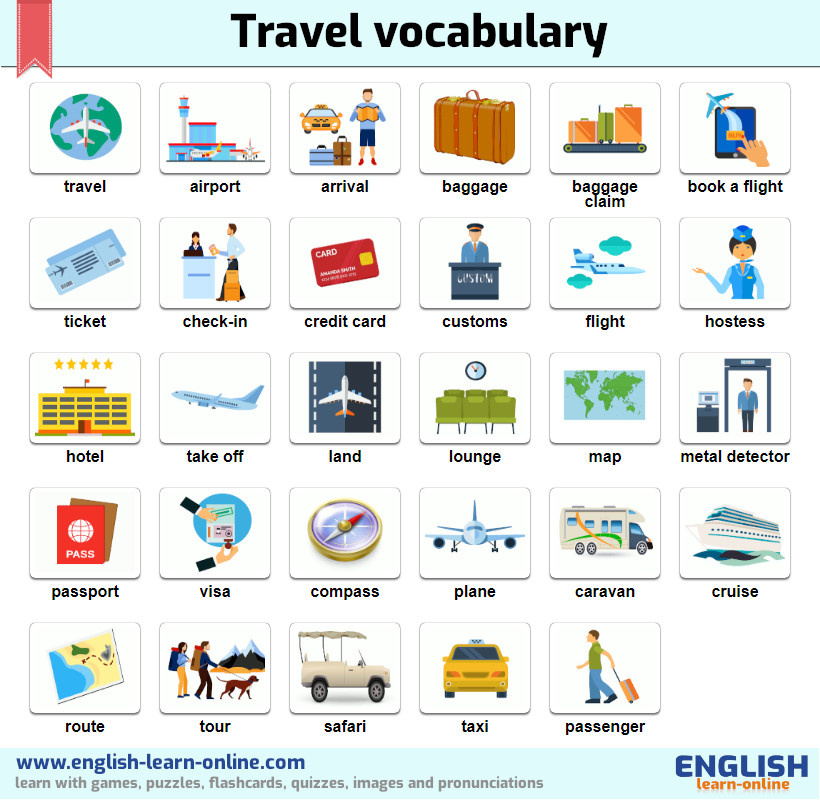
⬤ Picture quiz about travel vocabulary
Let’s check your travel vocabulary with images. Select the correct option according to the given picture. For every correct answer you get 10 points.
⬤ Listening test
This is a free listening test about travelling. First listen to the audio about travel. Then select the corresponding picture from the list.
⬤ Writing test about travel
Below is a vocabulary writing test about travel. Look at the image and write the name of the picture into the input box.
START
⬤ Spelling test about travel
Below is a vocabulary listening and spelling test about travel. Listen to the audio and then write what you hear into the input box. For every correct answer you get points.
⬤ Worksheets for travel vocabulary to download
Related pages, memory card game for travel, word scramble game for travel related words, word search puzzle for travel, make words game for travel expressions, wetman game for travel, accessories vocabulary 👓 exercises pictures audio, body parts in english 👨 with games and listed images, classroom objects vocabulary in english 📕 with games, clothes vocabulary in english 👕 learn with images and flashcards, colour names in english 🎈 with tests and images, computer parts (hardware) vocabulary: pictures audio, verb to be (am, is, are) – with examples and online exercises, modal “can” – with explanations exercises and activities, present continuous tense – with usage examples and pictures, simple present tense (do-does) – with usage, pictures and example sentences.
© www.english-learn-online.com All right reserved You can write us any mistakes or read our about page or see our privacy policy .
My English Language
English language resources for efl students and teachers.

Travel and Transport
Travel vocabulary: using english for travel.
Travel vocabulary is one of the most useful areas of language learning today, as more people than ever are travelling far and wide for business and pleasure. There are many useful words and phrases we use when travelling and dealing with transport.
Although our travel plans have been put on hold for a while due to the Coronavirus pandemic , the world is slowly starting to open up again. This means we need to be ready with our travel language and vocabulary for when we can get a flight, a bus or a train!
For non-native speakers , travel vocabulary is a particularly useful topic of study and always a popular subject, allowing you to enjoy organising your travels without worrying about language issues.
Explore travel vocabulary here and learn useful vocabulary related to travelling and using public transport. We have included useful words related to using trains, buses, cars, taxis, planes and boats, so you can have your travel phrases covered, whatever your mode of transport.
General English Travel Vocabulary:
to arrive , to depart, to leave, to stay,
to cancel, cancellation, cancelled, delay, delayed
to book, to reserve, reservation, to cancel a reservation
holiday, business trip
suitcase, bag, luggage
trip, journey, to travel, map
travel agent, brochure
ticket office, fare, price, single/return ticket
by foot, on foot
travelling by plane, by train, by taxi, by car, by boat
roundabout, road, traffic lights, speed limit, junction, cross roads, road signs
Image source
Transport Vocabulary and Useful Phrases:
Wheels, steering wheel, dash board, indicators, headlights, roof, bonnet, boot, engine, battery, windscreen wipers, garage, car mechanic, petrol station, service (a ‘check up’ for a car)
Double decker, single decker, passengers, bus driver, bus stop, bus station, bus conductor, coach, luggage hold, bus lane
Bus travelling phrases:
the next stop, the last stop, to get on/off the bus, to buy a ticket
Train station, platform, track, level crossing, locomotive, underground, cross-country, local, return, single, ticket, carriage, first/second class, train driver, ticket inspector, waiting room, seat, timetable, guard, season ticket, fare, travel card, buffet car
Train travel phrases:
to catch a train, to check the timetable, on the platform, to travel cross-country
to get on the train, to embark, to set off (on a journey)
to get off the train, to disembark, to alight
ticket machine – a machine where you can buy your train tickets
ticket gate – a mechanical gate blocking access, where you need to insert your ticket to pass through
the buffet car – a carriage on a train where you can buy drinks and snacks
Grand Central Station , New York City – image source
Cab, black cab (official English taxi), fare, taxi rank, taxi driver, tip ( noun and verb )
Taxi travel phrases:
to hail a taxi / to flag down a taxi (when you raise your arm to get a taxi driver’s attention to encourage it to stop in the street)
to pay the fare (the fare is the fee for the journey)
to tip the driver (verb) / to give the driver a tip (noun)
Aeroplane, airport, airline, wing, runway, pilot, gate, passport, excess baggage charge, cabin crew, flight attendant, air steward/stewardess, security, turbulence, seatbelt
take off, landing
turbulence (uncomfortable, sudden movements of a plane due to air pressure/temperature changes)
hand luggage (luggage you take into the cabin with you)
hold luggage/checked luggage (luggage you check in for stowage under the aircraft)
over-head locker (where you can put your hand luggage)
boarding card, customs, departures, arrivals, lounge, aisle seat, window seat, check-in, in-flight movie, in-flight entertainment
terminal 1, terminal 2 / T1, T2 (a terminal is where passengers go to buy tickets, check in luggage, go to their boarding gate etc.)
boarding gate – where passenger go to board the plane (i.e. to get on the plane), located inside the terminal building
A plane takes off – image source
Plane travel phrases:
to put luggage/bags in the hold
to board the plane
prepare for take off, the plane will be taking off in 30 minutes
prepare for landing, the plane will be landing in 20 minutes
to fasten your seatbelt, to buckle up (‘buckle up’ is slang for ‘fasten your seatbelt’)
the flight was quite turbulent, to experience some turbulence, there was some light/heavy turbulence
“How was your flight?”
“It was good, thanks, except there was some turbulence during the descent that made me spill my drink!”
“Great – it was a smooth flight and I slept most of the time.”
Ferry, cruise ship, harbour, deck, port, sea, ocean, cabin, captain, sail, sea sickness , crossing, on board, life belt/jacket, foot passenger, buffet, port side, starboard
- The difference between a boat and a ship: boats are small to mid-sized vessels, often used for pleasure trips. Boat is also a generic term for water vessels. Ships are normally larger and are used to carry cargo, passengers or smaller boats.
Boat travelling phrases:
to embark (to get on the boat) / to disembark (to get off the boat)
‘choppy’ seas / rough seas / strong waves
Calm waters will provide a peaceful cruise for this ship – image source
calm waters / still waters
to sail, to have a good crossing (a ‘crossing’ is when you go from one place to another on a boat/ship) – e.g. “Did you have a good crossing?”
to go out on deck (to go outside on the ship)
welcome aboard/on board (you might hear this when you embark for the first time)
the captain’s table (where the captain sits at dinner – sometimes passengers might get an invitation to site at the captain’s table at some point during their cruise)
- ‘Plain sailing’ is an idiom that means an event that goes smoothly: ‘It’s all plain sailing from here’
It’s a great day to be ‘out on deck’ – image source
English at the Train Station
Useful travelling vocabulary for using the train, including phrases you may want to say, phrases you may hear and comments you might want to make about travelling by train:
- Train times on timetables are always given in the twenty-four hour clock format. So, 5.15 pm would be 17.15 and 9.05 am would be 09.05.
A busy airport – image source
“How was the journey?”
“It was fine, the train arrived on time and I managed to buy a coffee from the buffet car.”
“Terrible, the first two trains were cancelled and then I had to stand up for the entire journey.”
“My train was delayed, so I passed the time by browsing in the station bookshop”
English vocabulary at the airport
Travelling vocabulary for using planes and visiting the airport, including phrases you might hear at the airport and sentences you might need to say when travelling by plane:
Click here to explore more essential English vocabulary and phrases for everyday situations.
When travelling and using transport, you might also need to ask for directions. Check out how to ask for directions in English when travelling around a city with our directions page. Our article includes possible questions you might want to ask and answers you could receive when navigating your way around a new town.
Let us know your thoughts on travel vocabulary
What do you find most difficult about using English when travelling?
Do you find any of these phrases related to travel and transport confusing?
Can you think of other useful English travel vocabulary for using different modes of transport?
TEFL teachers, how do you incorporate travelling vocabulary into your English lessons?
2 thoughts on “ Travel and Transport ”
Thank you for the provided phrases and words. I would also like to see a short dialogue or common phrases when someone got lost in a city or trying to get somewhere, so that there should be various options for speaking about traveling ina city
Hi Tatyana, thanks for your comment. A dialogue like this is a great suggestion. We will looks to add something like this to the travel and transport page soon. In the meantime, you might find our directions page useful, as this contains phrases for asking for directions when travelling in a city.
Leave a Reply
Your email address will not be published. Required fields are marked *

Essential Travel Vocabulary – Improve Your English
It’s so much fun to travel, practice your English, and learn new things! Traveling is a lot easier if you know some essential English travel vocabulary. These are words you really need to know before you go! Ryan is going to share 17 of these necessary vocabulary words for traveling.
Hi everyone! Traveling is one of my five great passions. I love:
- Working with kids
- Learning new languages
- Meeting new people
Some of the best things I’ve ever experienced happened while I was traveling! I’ve been to:
- The Great Wall of China
- The Fos de Guasso in Brazil
- I’ve met amazing people
- I’ve even fallen in love!
All while traveling! So today, I want to share with you 17 essential travel vocabulary words I use when I talk about my adventures and my travels. Use them to talk about YOUR adventures and YOUR travels, too!
17 Essential Travel Vocabulary – Words 1-5
1. Book (a flight)
A book is something you read (a noun), but the verb “to book” means “to reserve.” If you “book a flight,” that means you reserve a flight.
I booked a flight to Buenos Aires. Now I need to book an accommodation.
2. Accomodation
An “accomodation” is a place to sleep. A hotel, an Airbnb, a hostel, even couchsurfing, are all accomodations.
Do you have an accomodation in Buenos Aires yet?
3. Make a Reservation
To “make a reservation” means to reserve the use of something – this can be anything! You can “book” an accomodation, specifically, a house or a room to sleep in. To “make a reservation” can also apply to a room, but it can also be a rental car, or a tour. You can fly around the city in a hot air balloon, but you need to make a reservation!
For example, I could say:
I want to go on the dungeon tour. I need to make a reservation. If I want to stay at the Luxor Hotel in Las Vegas, I need to call or go online and make a reservation.
So I’ve booked a flight, I’ve found my accommodation, and I made a reservation for a car rental. Now it’s time to fly!
4. To Take Off
The verb phrase that we use to describe this is “to take off.”
My flight takes off at noon. Has your flight taken off yet?
The verb “to land” is the plane arriving at its destination. “To land” can also refer to anything that is flying, then comes to the ground. I could say:
The butterfly landed on my shoulder. The plane takes off at 8:00 am and lands at 5:00 pm.
You can also use the verbs “take off from” and “land in” to talk about when and where you are going. For example:
I take off at 7:00 am. I take off from New York. (I leave from New York.) I take off from Berlin and I land in Singapore.
If you are very lucky, your flight will not stop. It will go directly from “a” to “b” – from Berlin to Singapore. However, sometimes you have to stop. For example, the flight goes from Berlin to Singapore, but it might stop in Doha, Qatar.
Essential Travel Vocabulary – Words 6-10
6. Connection or Layover
When I stop in Doha, it is called a “connection,” or a “layover.” So when you are talking about airplane flights, the word “connection” means a city that your flight stops in before you reach your final destination. There are even more words to describe this!
Do you have a connection, or do you have a direct flight? Yes, I have a connection in Doha.
7. Leg (of a Trip)
If you have two flights to get to one destination, for example, Berlin to Doha and Doha to Singapore, each flight is called a “leg” – just like the legs I have above my feet!
The first leg of my trip is from Berlin to Doha. The second leg of my trip is from Doha to Singapore.
Another word for a connection is a “layover.” A “layover” is simply when you have to stop for a few hours in your “connecting” city. Either one of these sentences is correct:
I have a connection in Doha. I have a layover in Doha.
9. Stop Over
If your layover is very long, it’s called a “stop over.” This just means that you will stay in that connecting city for many hours – usually more than four hours.
Last year, I had a stop over in Ankara for 12 hours!
10. Travel Backpack
Before you travel, you need a backpack. Not any type of backpack – you need a “travel backpack.” A “travel backpack” is much bigger than a normal backpack. You have room for lots of clothes, a computer, some toiletries, packing cubes – for lots of things!
Travel backpacks aren’t essential, but they are so practical and useful!
Essential Travel Vocabulary – Words 11-17
11. Clamshell or Suitcase Style Opening
A travel backpack can open like a suitcase. This is also called a “clamshell” opening – meaning it opens like a clam – on three sides. This is important because it allows you to pack very quickly, and to quickly access all your things.
12. Packing Cubes
“Packing cubes” are simply little bags to organize your things inside the travel backpack. For example:
I have my shirts in one packing cube. I have packing cubes for my shoes, my socks, and even the clothes I need to wash!
13. Toiletries
Now, the last packing cube you need is for your “toiletries.” “Toiletries” is essential travel vocabulary for things that you find in the bathroom, like a toothbrush.
Toiletries might include mouthwash, toothpaste, lotion, and shampoo. It’s a smart idea to put your toiletries in a clear bag, because that will make the security people very happy.
Let’s Review!
- You made your reservation.
- You booked an accomodation.
- You have a travel backpack with packing cubes and toiletries.
- You are ready to go!
- You take off from Buenos Aires.
- You land in Paris.
Now you are feeling really sleepy. This is called:
14. Jet Lag
“Jet lag” is the feeling of being tired after you travel because your body is used to a different time zone.
Sometimes when I travel from Europe to Asia I get jet lag.
15. Sightsee
This is a simple verb that just means to visit, or to look around. If I just landed in Shangai, I could say:
I really want to sightsee downtown! I really want to sightsee around the People’s Square!
If I’m traveling with a friend, I can ask:
“Hey, Foofy, do you want to sightsee around Stockholm tomorrow?”
You can also say to “go sightseeing,” if you don’t have a particular destination in mind.
“Hey, Foofy, do you want to go sightseeing?”
What’s Next?
- You’ve been sightseeing; observing the city and taking it all in.
- Now you’re ready to go to a new city!
You can book a trip on a bus, or make a reservation for a flight, or you could try:
16. Hitchhiking
“Hitchhiking” is when you put your thumb up and ask people for a ride! I’ve “hitchhiked” almost 100 times in many countries, and I’ve always had great experiences. You can have fun conversations and meet really cool people. It’s not always the most fun way to travel, because the weather might be bad or people might be rude, but it’s worth a try!
17. Bucket List
Hitchhiking was on my “bucket list.” A “bucket list” is a list of things you want to do before you die. It comes from an English idiom “kick the bucket,” which means “to die.” Here are some things on my bucket list:
- Visit Antarctica
- Learn 10 languages
- Become a father
- Teach sports and English at a kids’ camp
What’s on your bucket list? I’m curious! Let me know in the comments below! I’d love to hear what you think.
Now that you know how to get where you want to go, check out this post to help you save money along the way!
if you want to continue on your English journey, we have a great ebook for you called Travel English Expert.
The Travel English Expert is a collection of 50+ recorded conversational lessons with a text guide. Everything is directly related to real world travel. This course will give you templates to practice your listening & speaking skills – including more essential travel vocabulary – even if you aren’t planning an awesome trip to Singapore any time soon!
I hope these 17 Essential Vocabulary Words for Traveling were helpful for you! Be sure to leave a comment, and check back soon for more great English tips!

Gabby Wallace, M.Ed TESOL
About the Author Gabby Wallace is the Founder of Go Natural English, where you can quickly improve your confidence speaking English through advanced fluency practice. Even if you don't have much time, this is the best place for improving your English skills. Millions of global intermediate - advanced English students are learning with Gabby's inspiring, clear, and energetic English lessons. Gabby has a Masters Degree in Teaching English to Speakers of Other Languages from Boston University and 20+ years experience helping students become fluent through her online courses and membership program.
Looking for something? Use the search bar below
Let's connect, learn more with paid options.

English Insiders Membership
Get premium daily lessons (text, audio & quizzes for just $3 USD / month!

The English Fluency Formula Ebook
Get the most popular audio ebook online for quickly improving your English fluency.

The Fluent Comunication Program (50% off VIP Access to All Courses)
Don't waste time! Get an instant, all-access pass to hundreds of premium lessons. Organized and guided recorded video lessons with quizzes to give you everything you need for fluency, right now. Normally $997, you can join for 50% off for just $497 USD. This is a one-time payment with lifetime access.

You are using an outdated browser. Please upgrade your browser or activate Google Chrome Frame to improve your experience.
Travel English Phrases You’ll Need for Your Next Trip
English is essential for communication in most countries.
Wherever you are going, you need to have a good grasp of the basics of the language to get around and communicate at the airport, hotel and everywhere in between.
This post has dozens of travel English phrases to help you navigate any foreign country. Learn what they mean and how you can use them!
At the Airport
On the airplane, arriving at your destination, riding public transportation, at the hotel, at a restaurant, sightseeing, emergencies, and one more thing....
Download: This blog post is available as a convenient and portable PDF that you can take anywhere. Click here to get a copy. (Download)
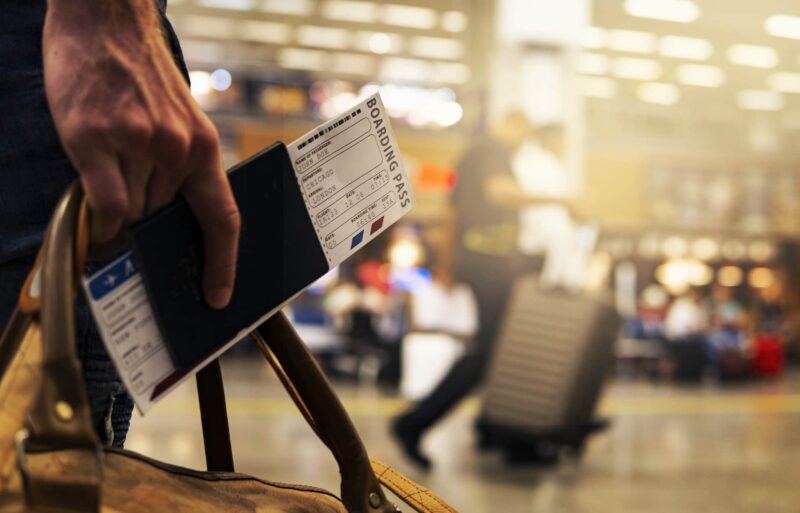
Excuse me, how do I… ?
If you are flying for the first time, you will need information on how to:
- Check in. When you check in , you are letting the airline know you have arrived. If the person you are talking to tells you to go to the check-in counter, you can follow up this question with “how do I get to the check-in counter?” to get directions. At the check-in counter, you present your ticket , a document that allows you to get your boarding pass. The boarding pass, in turn, will allow you to board (ride) your airplane.
- Board the airplane. If you are not sure about what you should do before you get on a plane and during your flight, you can ask the airline staff about this.
Where is the… ?
You will likely ask for general directions to one or more of the following:
- Information desk. As you can guess from the name, the information desk is where you can learn everything you need to know about getting around the airport. You can even ask for a map (a picture guide of the area) from them.
- Gate. A gate is where you will enter to get to the airplane. It is also the place where you wait before boarding your flight. The gate is usually written on your boarding pass.
- Restroom. A restroom is a place where you take care of personal business like combing your hair, washing your face or using the toilet. Depending on the country you are visiting, this room may also be called a bathroom , washroom, comfort room, loo or toilet .
- Charging station. If your phone has low or no battery, these places can get your device’s battery up to 100 percent again.
- Restaurant. If you feel hungry while waiting for your flight, you can visit a restaurant where you can eat in the meantime.
How do I get to… ?
Although they both seem to ask for directions, there is a slight difference between “where is the… ?” and “how do I get to… ?”
“Where is the… ?” will get you a general answer like “(The place you want to go to) is at Building A.”
Meanwhile, “how do I get to… ?” asks for specific directions, so the person you are talking to will reply with “From here, you turn left, and when you see this sign, turn right…” and so on.
What time is my flight?
Often, it may not be clear what time your specific flight is—in which case, this question will be useful.
What items am I allowed to bring on board?
Airlines usually have rules on what you can and cannot take into the airplane.
How much luggage am I allowed to carry on?
Your luggage includes all the bags you are bringing with you for the flight. Airlines often have limits on how much and how heavy your luggage should be.
Are meals included?
A meal is a collection of food served at one time. Not all airlines provide meals, so it may be good to ask if you will get these before you board.
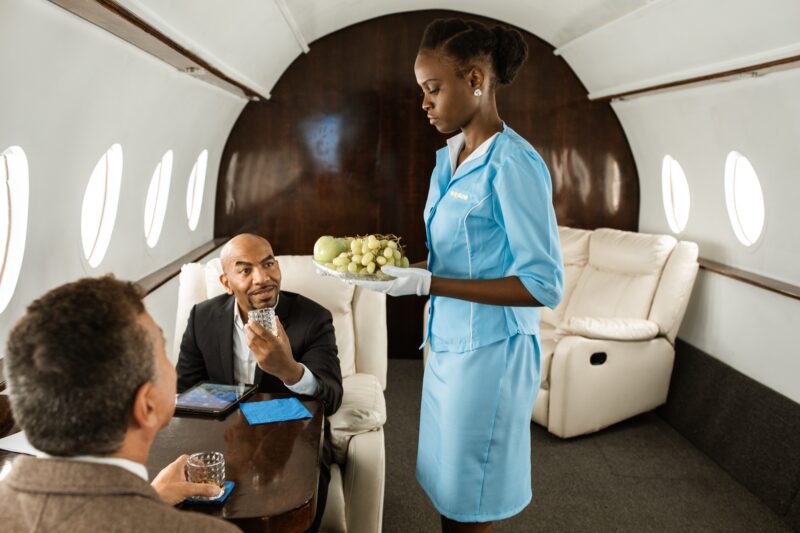
Excuse me, can you please help me put my luggage away?
Airplanes have baggage compartments or closed spaces above each of the seats. You can ask the flight attendant, an airplane employee in uniform who is usually female, to help you put your luggage in its compartment.
Can I please change my seat?
Once you get on the plane, you may want to change your seat because other seats are more comfortable, have a better view, etc.
How much does… cost?
You can ask about the cost of anything you want to buy like the following:
- water bottle
- snack (a small meal)
I would like… , please.
This phrase is the standard and polite way to ask for something that is usually free or something you do not have to pay for. For example, if you are thirsty, you might say “I would like a glass of water, please.”
Does my seat have… ?
For example, if you want a device to return your phone’s battery charge at or above acceptable levels, you can say “does my seat have a charging port ?” And if you want to move the seat back so you can lie down, say “does my seat have a recline button ?”
Excuse me, I need to…
There are a few things you can ask permission for on a plane. You can say “Excuse me, I need to…”
- Get out of my seat
- Use the restroom
- Move my luggage
What time is it?
This is a standard question for figuring out what time of the day it is. It is useful when you are flying over different time zones and when the plane finally lands.
For more vocabulary and phrases related to air travel, take a look at this post—it’s aimed at flight attendants, but you’ll learn a thing or two as well!
Knowing English for flight attendants is essential in today’s interconnected world. These 60+ English words and phrases will prepare you for the job before, during and…
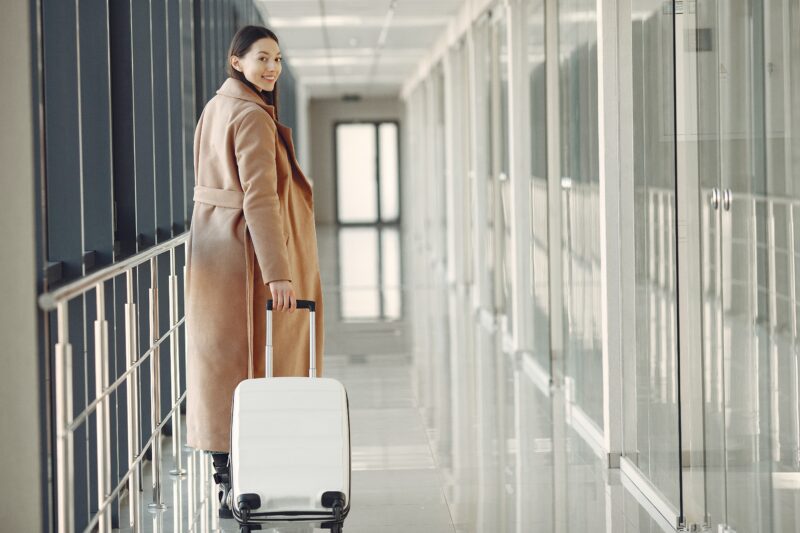
Once you are at your destination (the place you are visiting), some of the useful phrases you can use are the following.
Just like at the airport when you first arrived, “Where is the… ?” and “How do I get to… ?” are useful phrases when you are at your destination.
Some of the places where you might need directions are:
- Baggage claim area. Remember when you checked in your luggage? This is the place where you claim or get it.
- Currency exchange. A currency exchange is a place where you take the money you use in your own country and get it changed to the money used at your destination.
- Bus stop. Finding a bus stop will be especially helpful if you want to find a cheap way to get around. Asking “where is this bus going?” can also help you know if you are riding the right bus.
- Taxi / Taxi stand. No bus? Take a taxi instead, which is also called a cab in some places. You can usually find a group of taxis at taxi stands.
- Hotel. Of course, you should provide the name of your specific hotel.
- Immigration or customs. Immigration or customs is the place where you have to explain why you came to a country and tell officers what your intentions are.
Sorry, I do not understand what you are saying.
This phrase will help native English speakers know English is not your first language. You can also say “I do not speak English very well” and ask them to “please speak slowly” if you are still having trouble.
I recommend that you prep before you go by studying authentic English media like movies and TV shows. These can help you prepare for real interactions in English.
FluentU takes authentic videos—like music videos, movie trailers, news and inspiring talks—and turns them into personalized language learning lessons.
You can try FluentU for free for 2 weeks. Check out the website or download the iOS app or Android app.
P.S. Click here to take advantage of our current sale! (Expires at the end of this month.)

Try FluentU for FREE!
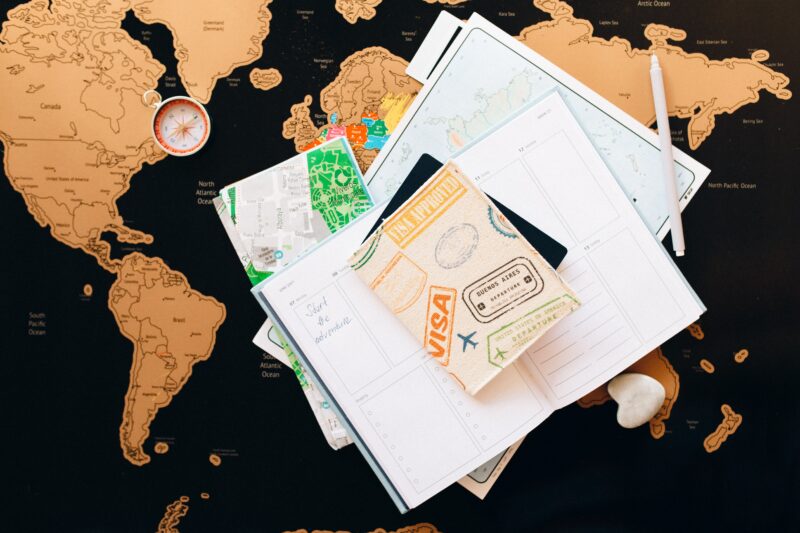
I have items to declare.
Aside from explaining why you are in a certain country, you also have to declare (make a formal or official statement on) the items that you may need to pay duties (taxes on items from another country) for.
If you do not have such items, you can simply say “I have nothing to declare.”
I have a connecting flight.
This is how you say you will board another plane to go somewhere else.
I am traveling for…
Depending on why you came to the country, you can say you are traveling for:
- Leisure. Say this if you are traveling because you are on vacation.
- Work. Say this if you are traveling because your company asked you to .
- Family. If you are traveling because you are visiting relatives, let the customs officer know.
I will be here for… days.
You will need to provide the number of days you will be staying in the country, like “I will be here for 90 days.”
If you have it, you can also show your visa , a document that proves you are allowed to enter the country for a certain purpose within a certain period.
I am staying at…
The customs officer may ask you where you will be sleeping. You can say “I am staying at (the name of your hotel)” or “I am staying at (the address of your family or friend in the country).”
Check out more airport vocabulary here .
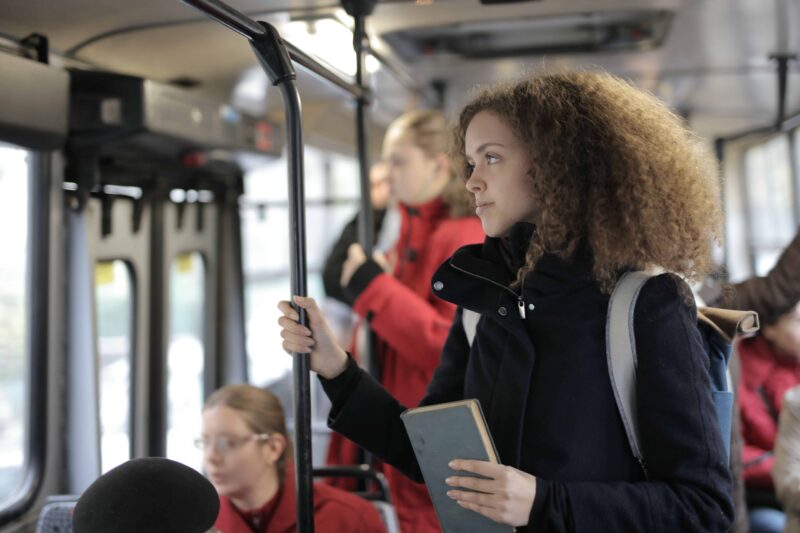
Now that you have arrived, you need to know how to get around. Here are some useful phrases you can use whether you are riding a bus, train or any other form of public transportation.
Does this go to… ?
Before you get on a bus or train, ask whether it is going to the place you want to go. If the driver says no, you can ask “how do I get to… ?” and take note of the directions they give you.
How long does it take to get to… ?
Here, you are asking how many minutes, hours, etc. it will take for the vehicle to get to your destination.
How much is the fare?
The fare is the price of riding your public transport.
“Do you accept… ?”
End this question with a mode of payment , which includes cash and cards .
Excuse me, is this seat taken?
This phrase is useful if you see someone with an empty seat beside or near them, but you want to be 100% sure they do not have a companion.
I missed my stop. Can you please let me know when we are at the next one?
In an ideal world, traveling would go smoothly. But sometimes, things like not being able to get off at your stop happen! Luckily, you can use this phrase to get you out of a pickle (get you out of trouble).
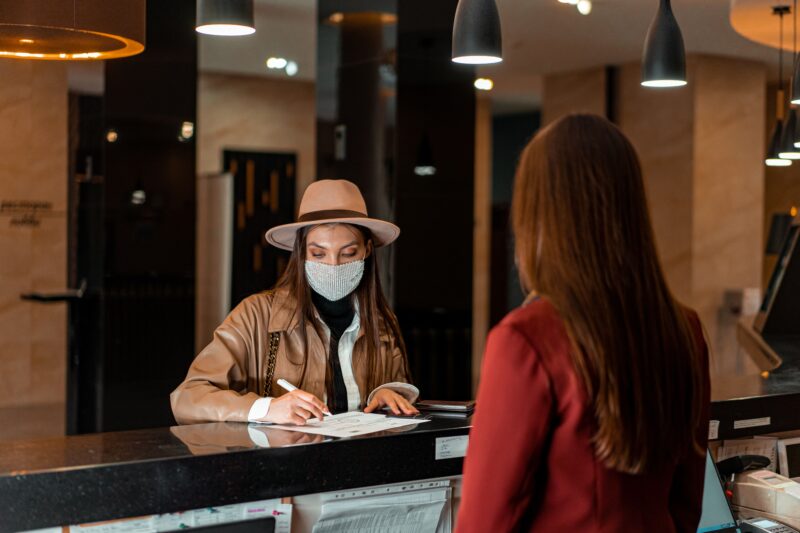
Of course, if you are staying with friends and family, you can skip this section. But if you will stay at a hotel, keep the following phrases in mind.
Greetings! I have a reservation under the name of…
End the phrase with your full name or the name you used to make your reservation.
When you get to your hotel, go to the front desk. It is easy to find because that is usually where you will first meet the hotel’s employees. Also, that is where the other guests will probably be!
You want to confirm that you have a reservation first—that is, proof that you have a room at the hotel where you are staying. Otherwise, you have to look for somewhere else to stay.
What is included in my reservation?
This question asks what services you have already paid for. Of course, there is your room, but you may also want to check for other things like breakfast, pool, spa, etc.
What time is check-in / check-out?
Since you will not be staying at the hotel all the time, you will want to know what time you can check in and check out.
Check in means the time you will be allowed to enter your room, while check out means the time you should leave your room.
Does the room have a… ?
You may also want to know about your room’s amenities (things to help make your stay more convenient and comfortable). For example:
- Bathroom / restroom. Again, the correct term for this place depends on where you are.
- Refrigerator / fridge. A refrigerator or “fridge” is a place to keep your food and drinks cold. Keep in mind that you may have to pay extra for any food or drinks you take out of hotel refrigerators.
- Wi-Fi. Wi-Fi is simply a wireless internet connection. You should probably also ask for the Wi-Fi password. ( “What is the Wi-Fi password?” )
- Air conditioner. An air conditioner is a piece of equipment that cools a room.
How many beds are in the room?
This question will help you know if there is enough space to sleep for the number of people in your hotel room.
What floor am I on?
A floor in this situation refers to the level of the hotel.
If you are on a high floor (like the 30th, for example), you may want to use the elevator , the device that lifts and lowers you between floors of the hotel, to help you get to your room.
My room needs…
Most of the time, housekeeping (the people who clean the room) will make sure you have everything you need. Should they forget, you can say “My room needs…” and finish with:
- Towels. Towels are soft, thick materials you use to dry yourself after taking a bath.
- Toilet paper. Toilet paper are thin white sheets rolled up on tubes. They help you wipe yourself in the bathroom.
- Bedsheets. “Bedsheets” is a term that includes pillowcases, blankets and all the other pieces of cloth that cover your bed.
Could I please have room service ?
As a guest, you can request services by saying “Could I please have… ?” For example, you can request room service , where someone will come up to your room to deliver food, drinks and other things you may need.
Where is the best… around here and how do I get there?
Since the hotel employees are locals, they will probably know the area more than you do.
Before you check out of your hotel, you can use this phrase and replace “…” with:
- Grocery store. Grocery stores are places where you can buy most types of items.
- Hospital. If you or someone you are traveling with gets sick or injured, you need to know where to go.
- Bank. If you run out of money, you may need to go by a bank to get more.
- Restaurant. Make sure you ask for a restaurant that offers local cuisine or food.

A table for two, please.
The number indicates how many people will be eating with you at the restaurant. It does not have to be just two: it can be any number of people with and including you.
I would like to drink…
Finish this phrase with the name of the drink you want. Popular drinks are:
- soda pop (carbonated sweet drinks)
May I see a menu?
A menu will help you decide what you want to eat.
I would like to order, please.
Once you have decided what to eat and drink, raise your hand and wait for a waiter to come to your table. Then, say this phrase to indicate that you are ready to order or ask questions about the food.
Could you recommend any popular dishes?
This is a good question to ask if you are not sure what to order.
May I ask if you have dishes that are… ?
You may prefer certain foods to others for personal reasons. For example, you can finish the question with any of the following:
- Vegetarian / Vegan When you say that dishes are vegetarian , that means they are mostly made of plant-based ingredients. When you say they are vegan , it means they do not have any animal ingredients (even eggs or milk!) at all.
- Halal. If you are a Muslim, you want to make sure that what you eat does not go against the laws of your religion. You may need to explain what ingredients make a food halal or haram , though.
Can you tell me about any potential allergens in this dish?
Allergens are ingredients in your food that can cause you to have a negative reaction. It may be a good idea to ask about these before you order a dish. The last thing you want is to not enjoy your meal because you got sick!
Can I please have… ?
Fill in the blank with an item off of the menu or one of these items:
- Appetizer. An appetizer is a small dish you eat before the main course (meal).
- Soup. Soup is a common way to start meals.
- Salad. If it is too warm for soup, try a salad!
- Dessert. A dessert is a sweet dish you eat after the main course.
- A glass of water. If you are not interested in any particular drinks, a glass of water is always a good option.
- Extra sauce / salt / spice. If you think your dish could use a little more sauce, salt or spice, you can ask if you can have more.
Can I ask for a refill?
The word refill comes from the prefix re- (which usually means “to repeat”) and fill . If your glass of water is empty and you want more, you can ask for a refill so your empty glass will have water again.
May I have the bill?
The bill indicates how much you have to pay after you eat the meal. Make sure to ask for this. In some restaurants, the waiters will not bring it to your table unless you ask.
If you want more useful English phrases to use in restaurants, check out this post on ordering food in English .

Of course, your trip would not be complete without souvenirs or items you buy to remember the place you visited! To make the most of your visits to shops, here are a few phrases to keep on hand.
Excuse me, where can I find… ?
Finish the question with what you are looking for.
Excuse me, how much is this?
This is a standard phrase for asking the price or cost of items.
Do you offer discounts?
When you ask for discounts , you are asking if the item comes at a lower price. Usually, the discount is shown in percentages (%). For example, if an item is $10 and there is a 50% discount on it, the final price would be $5.
Do you have a sale?
Another way to save money is to watch out for sales or events when you can buy items for much lower than their original cost.
Does this come in a bigger / smaller size?
If you are buying clothes, you may not be able to find something that fits you. In that case, use this phrase to check if they have your size. You can also ask “can I try this on?” to make sure the piece of clothing really fits!
What is your return and exchange policy?
Sometimes, you end up buying an item that you do not like or has defects (something wrong with it). A return and exchange policy allows you to either return (give back) the item to the store or exchange (switch or change) it with a similar one.
What forms of payment do you accept?
Here, you are asking if they accept cash, cards or any other form of payment you have on hand.
Can you recommend something similar to this?
If you find something you like but not quite or you want more varieties (colors, sizes, etc.) of the same item, this is a good question to ask.
For more shopping vocabulary you should know, go here .

Aside from the stores, you also want to check the sights and sounds of your destination! For those, here are the phrases you can use.
Where is the visitor information center?
The visitor information center is where you can get everything you need to know about an area—maps, landmarks, restaurants, shops, etc.
Excuse me, can you tell me what attractions I should check out around here?
There may be so many attractions in the area, you will not know where to start. This question can help you make your itinerary or travel plans for the day.
Are there any guided tours for this area?
Then again, you may not need to explore the area on your own. With a tour guide , you can plan where you want to go, get information on each attraction and even some interesting tidbits (facts) about them!
Are there any rules and restrictions I should know?
As a visitor, the last thing you want is to get into trouble. You want to know what you should do (the rules) and what you should not do (the restrictions).
Can you take a photo of me in front of… ?
A trip is not complete without pictures you can post on social media! There are times when you may want to take pictures of yourself in front of a site and that is where this phrase comes in.
Are there any events or festivals around here?
If you want to enjoy the place the way the locals do, this is a question you should ask.
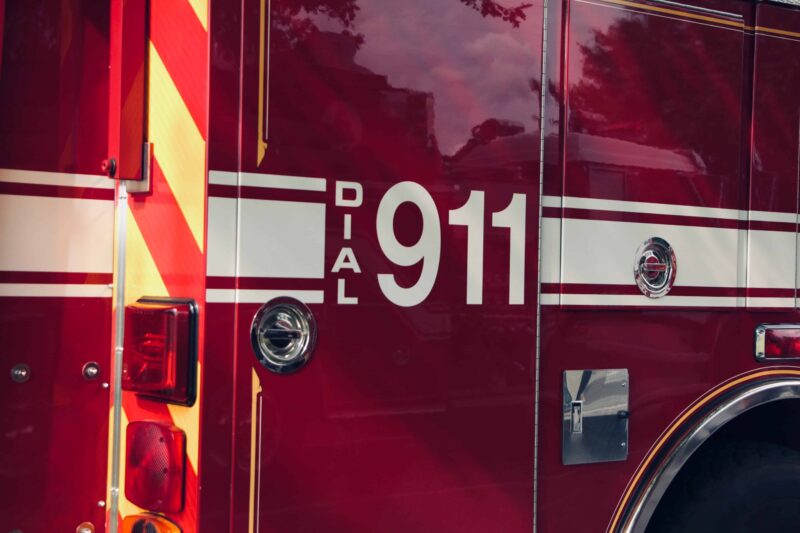
Even with careful planning, you may encounter some problems with your travels. Here are some phrases to help you out if something bad happens.
I have lost my…
End this phrase with any valuables (important items) you lose, such as:
- Passport. If you lost your passport, you need to find an embassy or state organization that represents your home country in the place you are visiting. To ask for directions to the embassy, say “where is the embassy for… ?” and end the question with your country’s name in English.
- Wallet. If someone stole your wallet or something else from you, you need to contact the local police , the organization responsible for dealing with crimes. In the United States, for example, you can call 911 on a phone.
- Way. When you say you have lost your way , you mean you are not sure where you are and where you should go. If you have a destination in mind, you can say “how do I get to… ?” and end the question with where you want to go.
If something bad is happening to you, calling out this word will get people’s attention and—hopefully—get you the help you need.
I feel…
Sometimes, the people who come to help you may need more information about what you need help with. For example, you could say “I feel…”
- Dizzy / Faint. Dizzy or faint means your head feels light, as though it is being turned around and around.
- Sick. If you do not feel well in any way, you should say “I feel sick.”
If your body hurts, you can also say “I am in pain.”
With these travel English phrases, you should be able to get around most countries without much trouble.
Enjoy your trip!
If you like learning English through movies and online media, you should also check out FluentU. FluentU lets you learn English from popular talk shows, catchy music videos and funny commercials , as you can see here:

If you want to watch it, the FluentU app has probably got it.
The FluentU app and website makes it really easy to watch English videos. There are captions that are interactive. That means you can tap on any word to see an image, definition, and useful examples.

FluentU lets you learn engaging content with world famous celebrities.
For example, when you tap on the word "searching," you see this:

FluentU lets you tap to look up any word.
Learn all the vocabulary in any video with quizzes. Swipe left or right to see more examples for the word you’re learning.

FluentU helps you learn fast with useful questions and multiple examples. Learn more.
The best part? FluentU remembers the vocabulary that you’re learning. It gives you extra practice with difficult words—and reminds you when it’s time to review what you’ve learned. You have a truly personalized experience.
Start using the FluentU website on your computer or tablet or, better yet, download the FluentU app from the iTunes or Google Play store. Click here to take advantage of our current sale! (Expires at the end of this month.)
Enter your e-mail address to get your free PDF!
We hate SPAM and promise to keep your email address safe

- Facebook Profile
Learning English with Oxford
The latest language learning tips, resources, and content from oxford university press., essential english travel vocabulary | part 1.
- by Oxford University Press ELT
- Posted on August 1, 2023 August 1, 2023

Planning to travel
- You might choose to have a staycation . This means you choose to stay at home rather than travel somewhere. This can be a cheap, relaxed, and enjoyable way to enjoy your break.
Instead of going abroad, Joana is having a staycation and exploring local parks.
- If you like exploring busy cities, you might decide to take a city break , which is a short holiday in a city, usually for a few days. City breaks are a great way to experience the culture of somewhere by visiting museums, art galleries and local parks.
Mazciek took a city break to London and saw Big Ben.
- Glamping/camping is when you stay outdoors, usually in tents. Glamping (glamorous camping) offers more luxurious facilities, such as a bed in your tent, electricity, and sometimes a bathroom.
Our family went glamping at the music festival – I can’t believe I slept in a proper bed in a tent!
- You might decide to take an eco-holiday . This is a trip focused on environmentally-friendly activities and sustainable tourism.
On their eco-holiday, JiaYi and Thibault learned about coral reef conservation.
- A fun and action-packed holiday that gets your heart racing is an adventure holiday. This is where you participate in exciting and often physically challenging activities.
Liesel’s adventure holiday included rock climbing and white-water rafting.
- If you like all your food, drink, and activities included in the price of your trip, you might enjoy an all-Inclusive holiday .
At the all-inclusive resort, Csilla didn’t have to worry about any extra costs.
Activities to do on your travels
Here are some ideas for some activities you can do whilst on your break.
- Maybe you want to take some rest and relaxation, also known as R&R . This means you want to take time to relax and take it easy. You could do this at the beach, at home, or in a park – wherever you like to chill out.
After a hectic school year, all I want is some R&R by the beach.
- The opposite of R&R is sightseeing . This is where you visit and view attractions or places of interest in a particular location. Often, you can take sightseeing buses around a town or city, or simply walk and explore. Part of the fun of being somewhere new is getting lost, right!?
During our trip to Mexico, we went sightseeing and saw the Frida Kahlo museum.
- Maybe you prefer to get some information about the place you are visiting from an expert, or the history of a specific attraction. In that case, you might like to book a guided tour.
The guided tour of Edinburgh castle was both educational and fun.
- If you’ve always wanted to give your time for free to help others or to benefit a community, you might like to volunteer .
Radha spent her holiday volunteering at a wildlife sanctuary in Tanzania.
- Cultural activities are when you engage in activities that reflect the culture of a place, like visiting museums, art shows, and galleries.
Tokyo offers a lot of different cultural activities; we loved the art galleries and traditional tea ceremonies.
Now, it’s time for your holiday! Whether you’re chilling at home, exploring a busy city, or diving into a unique cultural experience, there’s a world of opportunities waiting for you on your summer break. But before you pack your bags, don’t forget to come back for part 2 of this blog post on travel words in English. We’ll dive deeper into useful vocabulary for discussing your travel experiences, sharing the highlights and even the not-so-great moments of your adventures. After all, every trip has a story, and we’ll help you tell yours!
Do you know any other types of holidays we’ve missed? Comment below! For more vocabulary on travel and transport, check out this blog post !
Match the English travel vocabulary to their definitions.
- Sightseeing
- Guided tour
- Eco-holiday
- All-inclusive
- When all your food, drink, and facilities are included in the cost
- Rest and relaxation
- When you give your time for free
- Where you have a holiday at home or in your home country
- Sleeping in a luxury tent
- When you visit and look at attractions or places of interest
- A holiday with environmentally-friendly activities and sustainable tourism
- When an expert gives you information about a place on an organised tour
Billie Jago is an ELT writer and teacher trainer, specialising in digital & assessments. She is the founder of the professional development podcast ELTcpd and co-founder of the digital ELT content agency, otterelt .
Share this:
Author: Oxford University Press ELT
Every year we help millions of people around the world to learn English. As a department of the University of Oxford, we further the University’s objective of excellence in education by publishing proven and tested language learning books, eBooks, learning materials, and educational technologies. View all posts by Oxford University Press ELT
Thank you very much for the travel vocabulary review and the activity. I always do these tasks before I ask my students to do them. I made six correct guesses. But as for travel vocabulary additions, here are some: to travel solo, to go off the beaten track; to visit a museum (this item may be problematic to some learners: years ago, some authors commented that foreigners should be forewarned not to say “to make an excursion to a museum’, which some of them do,; it must be ‘a visit to a museum’ instead). Thank you.
I can think of holidays where you volunteer to work for free with children from unfavourable backgrounds or help with renaturalisation projects, etc. Mostly, accommodation and food are free but you have to fork out your own travel expenses. Did this kind of thing a few time in my youth.
Leave a Reply Cancel reply
Discover more from learning english with oxford.
Subscribe now to keep reading and get access to the full archive.
Type your email…
Continue reading
Travel Vocabulary
Do you often travel for business or for pleasure? Learn this essential travel vocabulary before your next trip!
Planning your journey
Some people book online , while others go to a travel agent and read the holiday brochures before buying tickets or making a hotel reservation .
You need to decide how much you want to pay for your flights. First-class or business class is the most expensive, while most people travel in economy class .
It’s also a good idea to buy some travel insurance before you go – just in case you have an accident or miss your flight . Independent travellers like to organise everything themselves, to avoid going to the same tourist traps (places where lots of tourists go). But some people prefer to book a package tour , where everything is paid in advance.
Travel vocabulary for flying
Most people travel by air – especially for a long-haul destination (somewhere far away) or for a short weekend break or city break . If you are travelling a long distance, you might have a layover (or stop-over ) for a few hours at an airport, or you might get a connecting flight (where you change aeroplanes).
When you arrive at the airport, you first check in at the check-in desk . If you have luggage for the hold , you weigh it here. Your luggage is taken onto the plane by baggage handlers (people who load the luggage on and off the plane.) You can take hand luggage with you onto the plane. You get a boarding pass (or boarding card ) to get on the aeroplane.
After this, you go through security (where your hand luggage is x-rayed ) and also through passport control , where your passport is checked. (You also go through passport control when you arrive at your destination.) In most airports you also see police and their sniffer dogs , who patrol for explosives. You can also go duty-free shopping , where you can buy things at a lower price. Check that you don’t go over ( = exceed) your duty-free allowance , or you will have to pay duty (tax) when you arrive at your destination.
When you are on the plane, the cabin crew look after you. There’s often an in-flight meal and the pilot usually makes an announcement about the flight route and flying altitude .
When you arrive, find out which baggage carousel your suitcases arrive on. Then when you collect your luggage, you need to go through customs and declare anything that you need to pay extra tax on. From there, you can take public transport to your hotel, get a taxi, or go to the car-rental desk – if you are going to hire / rent a car .
You can expect long queues in airports at certain times of the year, or if flights are delayed , for example. Sometimes, airport staff go on strike (stop work because of “industrial action”) which can also cause delays.
If the flying time is long, you can have jet lag when you arrive, as your body tries to adjust to the different time-zone .
Other means of travel
Here’s some more travel vocabulary if you are going somewhere by road, rail or sea.
If you take a road trip , you can go at your own pace . That means you can stop when you want. If you’re travelling in the UK, you can stop at the motorway services to fill up on petrol , get something to eat, or just for a comfort break (to use the toilet).
Travelling by rail can be a comfortable way to travel, especially if you have good seats and a buffet service (where you can buy food). It’s often cheaper to buy a return ticket (than two single tickets). Like travelling by air, you also have a choice of tickets: first class or second class .
If you travel by sea, you need to get to the port (for cruise ships ) or the ferry terminal . Both cruise ships and ferries have different decks , with the upper decks for passengers and the lower decks for cars or cargo.
More essential travel vocabulary words and phrases
suitcase = a large bag which goes in the hold of the aeroplane
baggage / luggage (uncountable noun) = everything that you take with you on holiday. “Do you have any hand luggage?” “The baggage handlers are on strike.”
oversize luggage = when your bag is very big (for example, if you are carrying skis) “There’s a special place to check in oversize luggage.”
handbag = a bag that women carry
backpack = a fabric suitcase that you carry on your back.
money belt = a fabric belt that you wear around your waist and where you put valuable things like your passport or money
travel documents = everything that you need to travel, such as passport and tickets
Travel Phrasal Verbs
Choose the correct answer.
Your answer:
Correct answer:
Your Answers
- Learn English
- Infographics

- English Vocabulary
100 + Travel Words explained 🛫🏝❤️ Best Free Lesson

You can jump to any section of this article:
Booking a Holiday
Travelling to your destination, arriving at your destination, places to visit, describing places, asking for help.
Whether you are going on a short holiday for a few days or planning to travel around various countries for a few months, having a basic understanding of the vocabulary and phrases you might need to use for communication is quite important.
English is a widely spoken language in the majority of countries that welcome tourism, so it would be beneficial to familiarise yourself with some useful phrases before departing.
In addition, if you could find out how to say some basic phrases in the country’s native language, I’m sure the local people there would appreciate your efforts!
Basic phrases in English that you should translate and try to use in the native language of your destination:
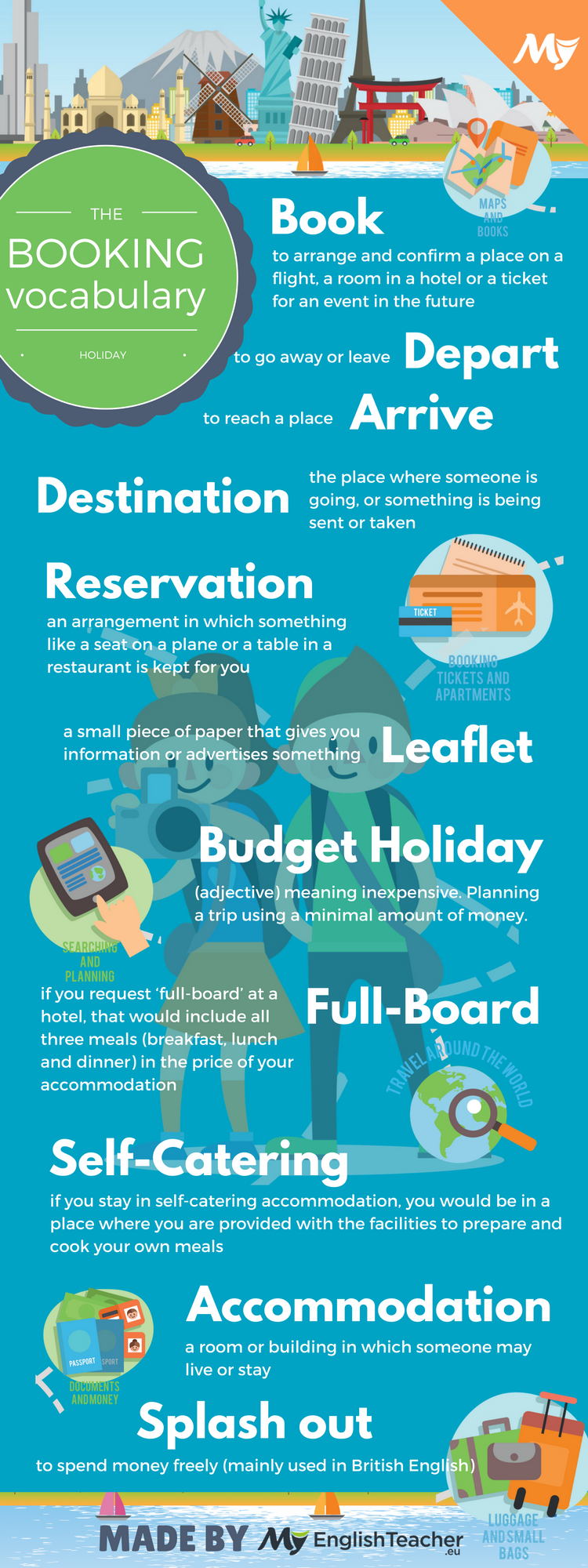
Book: as opposed to the noun (reading material), this verb means to arrange and confirm a place on a flight, a room in a hotel or a ticket for an event in the future.
Depart: to go away or leave, especially on a journey.
Arrive: to reach a place, especially at the end of a journey.
Reservation: an arrangement in which something like a seat on a plane or a table in a restaurant is kept for you.
Destination: the place where someone is going, or something is being sent or taken.
Complimentary: if tickets books or any other items are complimentary, it means they are given free, especially by a business.
All-Inclusive: Including everyone or everything. In holiday terms, this would refer to a hotel deal where the price usually includes accommodation, meals and drinks (any extra activities or facilities would be charged separately).
Travel Agency: a company or shop that makes travel arrangements for people.
Ticket: a small piece of paper or card given to someone, usually to show that they have paid for an event, journey or activity.
Brochure: a type of small magazine that contains pictures and information about a product or a company.
Leaflet: a small piece of paper that gives you information or advertises something.
Last Minute Deals: these are promotions that are advertised at the latest possible time for those who are more spontaneous!
Promotion: publicising a product to increase sales or public awareness.
Package Deal: an offer or agreement involving a number of related items or the acceptance of one being dependent on acceptance of another.
Half-Board: if you request ‘half-board’ at a hotel, breakfast and dinner would be included in the hotel price (as part of the package).
Full-Board: if you request ‘full-board’ at a hotel, that would include all three meals (breakfast, lunch and dinner) in the price of your accommodation.
Self-Catering: if you stay in self-catering accommodation, you would be in a place where you are provided with the facilities to prepare and cook your own meals.
Accommodation: a room or building in which someone may live or stay. Different types of accommodation include apartments, hotels, guesthouses and backpacking hostels.
Vacation: the American term for ‘holiday’.
Camping: the activity of spending a holiday (vacation) living in a tent or campervan.
Backpacking: to travel or hike carrying one’s belongings in a backpack.
Transfer: the act of moving someone or something from one place to another.
Budget Holiday: (adjective) meaning inexpensive. Planning a trip using a minimal amount of money. (Budget – noun) Having a limited amount of money for expenditure:
- ‘We have to keep within the household budget).
Travel Documents: all the necessary documents you would need to take with you on a holiday i.e. passport or ID card, driving license, flight/bus/ train tickets, visa confirmation etc.
Outbound: travelling away from a particular place, usually the first half of a journey.
Inbound: travelling towards a particular place, especially when returning to the original point of departure.
Two-way, Return Ticket (UK), Round Trip (US): a ticket that allows someone to travel to a place and back again.
One-way, Single Ticket: a ticket that allows a passenger to travel only to his/her destination, without returning.
Transport: (verb trans-PORT ) to take or carry goods or people from one place to another. (noun TRANS-port ) A system or means of conveying people or goods from place to place by means of a vehicle, aircraft or ship.
Splash out: a phrasal verb (mainly used in British English) meaning to spend money freely
Please enable JavaScript

Sample Conversation about Booking a Holiday: Travel Agent = TA, Customer = C
TA: Good afternoon madam, how can I help you today? C: Good afternoon, I would like to book a trip to Italy for 2 people and a 6 year old child please.
TA: Is there anywhere in particular you would like to go? C: I can’t decide between Venice or Rome, whichever is cheaper as we’re on a budget this year!
TA: Okay, and when would you like to go? C: We have two weeks of holiday between 18 th June and 2 nd July, and we’d like to go for at least 10 days during that period.
TA: No problem, I’ll just check to see which destination would be cheaper…. We have a special promotion on at the moment, if you book a package deal to Venice, you get free transfer to and from your hotel to the airport, plus one free meal each day. Would you be interested in that? C: Yes, that sounds great!
TA: And would you like full-board or half-board ? C: Well, seeing as we will get one free meal each anyway, I think self-catering would be better. I’ll have a little bit of extra money to splash out in a nice restaurant somewhere!
TA: Okay, that’s fine. We have a hotel that offers self-catering facilities and is right in the centre of Rome. They also have special facilities for children such as meal deals, extra beds, a play area in the lobby and a crèche. C: Perfect! I won’t need to spend too much money on transport and our son will surely have fun too!
TA: Exactly. Your outbound flight will be on the 19 th June, departing from London Gatwick Airport at 11:30am , and your return flight will be on the 30 th June at 10:30pm. That gives you 11 and a half days in Rome, does that suit you? C: Yes, that’s excellent, and we’ll still have a couple of days to recover before going back to work! How much will that be?
TA: Well, the promotion is £200 per adult, and your child can go for free because he is under 8 years old. That includes the return flights , accommodation for 11 nights, airport transfer and a complimentary meal each per day. Shall we go ahead and book it ? C: Wow, that is a fabulous deal! Yes please.
TA: Okay. How would you like to pay? C: Credit card please. Here you go.
TA: Thank you. Could I also see your passports please? C: Sure, here you go.
TA: Thank you. Here are your tickets and everything else you’ll need to know about your package holiday. Remember to keep all your travel documents safe throughout the whole trip. C: Thank you so much for your help!
TA: You’re welcome. Enjoy the rest of your day and please contact us if you have any queries before you set off on your holiday !
Recommended for you: Spa Fitness Gym Workout Massage Vocabulary and Dialogs Formal and Informal Email Phrases Starting with Greetings
NEXT: Packing Vocabulary
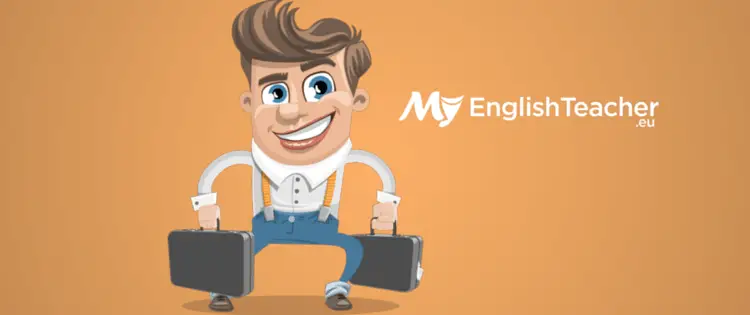
Suitcase: a case with a handle and hinged lid, used for carrying clothes and other personal possessions.
Backpack (US), Rucksack (UK): a bag with shoulder straps that allow it to be carried on one’s back.
Currency: a system of money in general use in a particular country.
Appropriate Clothing: suitable or fitting for a particular purpose, person or occasion.
Seasonal: relating to a particular season of the year (Autumn, Winter, Spring or Summer).
Swimwear, Bikini: clothing worn for swimming (bikinis are specifically for women).
Fanny Pack (US), Bum Bag (UK): a small bag used to safely store small valuable items when on holiday. This is usually worn around the waist and can be concealed under one’s clothing.
Sample Conversation about Packing:
A: Sarah, I’ve managed to book the flights and the train tickets for our vacation to Switzerland! B: Wow, that’s so exciting! So, are we leaving next month on the date we wanted?
A: No, we’re leaving next week! The travel agency gave us a great package deal and we’ve saved a lot of money, but it meant changing the dates to go earlier. We don’t have to work anyway, so I thought it would be nice! B: Oh, I see! Okay, that means we’ll have to start packing very soon. What will the weather be like?
A: Well, it’ll be spring but we’re going for 3 weeks, so I would say it’s safer to take clothing for hot and cold weather. We’ll probably go skiing too, so let’s pack our snow gear . B: Sure. I’m going to pack a few bikinis too, just in case we find a small beach!
A: It might be easier to take our backpacks , as we can fit more into them. B: I agree, they’re a lot bigger than the suitcases . Have you got all our travel documents together?
A: I just need to print off the flight confirmation details and the train tickets . B: Great. I’ll get some dollars exchanged to Swiss franc for the first few days. A: Okay, so you’re in charge of getting the currency sorted and I’ll keep all the travel documents together. Now, let’s start packing!
Recommended for you: Cooking / At the Restaurant Vocabulary and Dialogs Vacation vs Holiday in English! Travel, Trip, Journey, Tour, Voyage, Cruise, Crossing, Excursion, Expedition, Flight
NEXT: Traveling to your destination
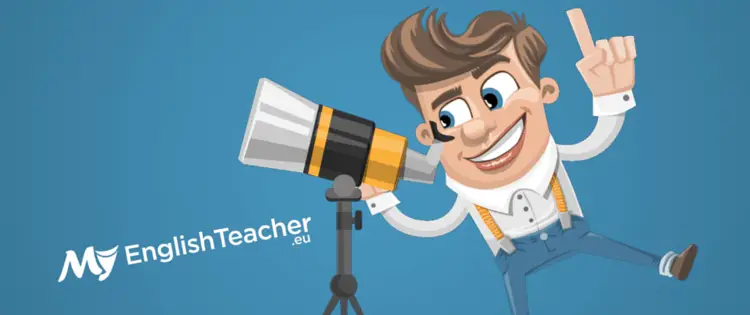
Check-In: the act of reporting one’s presence and registering, typically at an airport or hotel.
Departure Gate: gate where passengers embark.
Airport Terminal: this is a building at an airport, where passengers transfer between ground transportation and the facilities that allow them to board or disembark from an aircraft.
Departure Lounge: a seating area in an airport where passengers wait to board an aircraft or vehicle.
Duty-Free: Items available for purchase that are free of duty or tax charges in a particular country, generally sold at airports.
Ferry: a boat or ship for conveying passengers or goods, especially over a relatively short distance and as a regular service.
Take Off: (of an aircraft or bird) becoming airborne.
Board: to get on or into (a ship, aircraft or other vehicle).
Passport Check, Security Checkpoint: a barrier or manned entrance typically at a border of a country where travellers are subject to security checks.
Overweight: baggage weighing in excess of the allowed amount.
Destination: the place to which someone or something is going or being sent.
Window Seat: a seat positioned next to a window on a large vehicle or aircraft.
Aisle Seat : a seat positioned beside the walkway on a large vehicle or aircraft.
Sample Conversation about Checking-in at the Airport: Airport Attendant = AA, Passenger = P
AA: Next please! P: Hi. Good Afternoon.
AA: Good Afternoon sir. May I see your passport please? P: Yes, here you go.
AA: Thank you. Please place your luggage on the belt. P: (Places suitcase on the conveyor belt)
AA: I’m afraid this suitcase is 7kg overweight . You are allowed a maximum of 30kg and this suitcase weighs 37kg. You will need to remove some items or pay an additional fee for the extra weight. P: Oh no! I see. Okay, I’m happy to pay the fee.
AA: Is this your bag sir? P: Yes, of course it is.
AA: Did you pack it yourself? P: Yes.
AA: Were you given anything by someone else to take on the flight? P: No, definitely not.
AA: Do you have any of the following items in your luggage ? (points to images of dangerous objects) P: No, I’m certain.
AA: Okay, that’ll be 56 euros for the overweight case please. P: Okay, here is the right amount in cash. Also, could I please have a window seat ?
AA: I’ll just see if there is one available…. Okay, you’ll be seated in 25A. Here is your passport and boarding pass , please keep all your documents safe. Enjoy your flight. P: Thank you very much.
Recommended for you: Main differences between American and British English? Useful English Phrases For Running A Business Meeting Difference between LUGGAGE and BAGGAGE
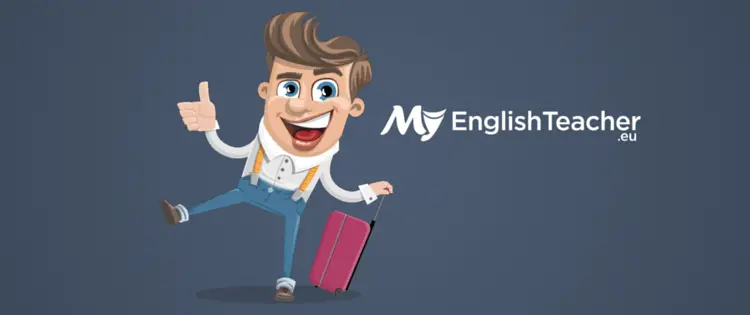
Landing: an instance of coming or bringing something to land, either from the air or from water.
Customs: the place at a seaport, airport or frontier where officials check incoming goods, travellers or luggage.
Baggage Collection Point, Baggage Reclaim, Baggage Claim Area: an area where arriving passengers claim checked-in baggage after disembarking from an airline flight.
Nothing to Declare: exiting the airport at a gate where you state that you do not have any goods where duty is payable or that need checking whether entry into the country is permitted.
Credit Card: a small plastic card provided by a bank or company which gives you access to money that you will need to pay back within an agreed time limit.
Debit Card: a small plastic card provided by your bank which gives you access to money that you already have in your bank account.
Porter: a member of staff in a hotel who assists guests with carrying their luggage.
Alarm: something to help you wake up at an appropriate time, this could be a sound notification on your smartphone or a telephone call from staff if you are staying in a hotel.
Room Service: requesting food, drinks or other services to be delivered to your hotel room.
Sample Conversation about Checking-in at the Hotel: Hotel Receptionist = HR, Guest = G, Porter = P
P: Good morning Sir, welcome to The Royal Pavilion Hotel. May I take your bags please? G: Oh, that’s very kind of you! Thank you. I am quite tired after that journey.
P: Please follow me this way to the check-in desk. HR: Good morning Sir, do you have a reservation ?
G: Yes, I booked online. HR: Which name was it booked in?
G: Mr. Graham Watts HR: Yes, I have it here. Could I see the credit card you paid with please?
G: Yes, here you go. HR: Thank you. Would you like an alarm call to wake you up?
G: Yes please. If you could call me around 11am, that’d be great. I would like to rest for a few hours before my meeting. HR: No problem. The complimentary breakfast is served until 11:30 and you can call for room service at anytime.
G: I will most probably do that! Thanks. HR: Your room is number 237 on the third floor and here’s the key. Our porter will help you with your bags and show you to your room.
G: That’s wonderful, thank you. Is there a Wi-Fi connection available in my room? HR: Yes, you’ll find the password in you room beside the TV. We hope you enjoy your stay with us. P: Okay Mr. Watts, if you please come this way, I’ll show you to your room…
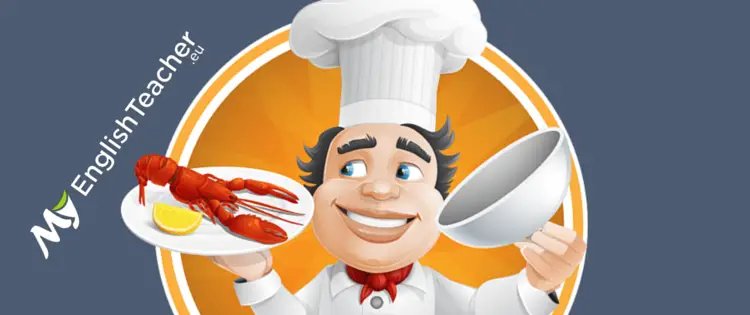
- Kitesurfing
- Rock Climbing
- Windsurfing
- Wakeboarding
- Paddleboarding
- Sunbathing
- Sightseeing
- Amusement Park
- Art Gallery
- Miniature Golf, Crazy Golf
- Animal Sanctuary
- National Park
- Invigorating
- Enervating
- Fascinating
- Old-Fashioned
- Picturesque
- Over-Priced
- Cosmopolitan
- Metropolitan
- Neopolitan
NEXT: Asking for help
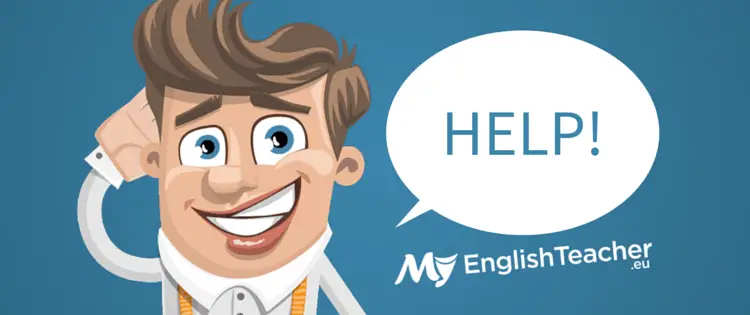
Catching someone’s attention:
- Excuse me, could I ask you a quick question please?
- Excuse me, sorry to bother you but could you help me please?
- Hello sir/miss, …
- Sorry sir/miss, …
- Excuse me, do you speak English?
Asking for information:
- You wouldn’t happen to know where … is, would you?
- I’m trying to find the …
- I need to get to the …
- How can I get to the …?
- Do you know where the … is?
- Where is the nearest …?
- I’m a little lost, where is the …?
If you miss a flight, bus, transfer, train:
- It seems I have missed my … could you please book me onto the next available one?
- I’ve missed my … is there any way of getting a refund?
- I’ve missed my … could you please give me information about the next one?
- Could you please help me to rearrange my …?
When you’re feeling unwell:
- Excuse me, is there a first aid room here?
- I feel really unwell, is there someone who can help me?
- I’m suffering from … do you have medical staff here?
- Do you have a first aid kit I could use please?
- I’ve injured my … could you please help me?
If there is something wrong with your luggage:
- My suitcase has not arrived yet, where can I get it from?
- My luggage is missing, could you help me please?
- My rucksack has been damaged, what can I do about this?
- I cannot find my suitcase, where can I check please?
Asking someone to translate:
- Could you tell me what it says on that sign please?
- Could you translate this message for me please?
- Could you please ask this person to …?
Prepositions and giving directions:
- (Turn) Right
- (Turn) Left
- Straight On
- Opposite the …
- Next to the …
- The … is on your (right, left)
- Before, After the traffic lights
- Take the first, second, third exit at the roundabout
More for you: Aviation Vocabulary ››› 19 most important words explained Difference between BEFORE and UNTIL Numbers, Years, Length, Dates in English!
RELATED ARTICLES MORE FROM AUTHOR

Understanding the Extroverted Introvert

Your Guide: List of 30 Helpful Synonyms with Explanation and Examples

50 Creative Ways to Say Happy Birthday: My Top Picks

48 Another Word for Impo or Important

Bear Homophones Demystified: Expert Guide
![Names of Generations, Years and their Characteristics [Generations Timeline] Names of Generations and years: The Greatest Gen, Baby Boomers, Gen X, Y, Z](https://www.myenglishteacher.eu/blog/wp-content/uploads/2020/06/Names-of-Generations-218x150.png)
Names of Generations, Years and their Characteristics [Generations Timeline]

I like using standard english

Such a great job to run this awsome site.

that is wonderful!
MOST POPULAR

👉 A BIG List of Prefixes and Suffixes and Their Meanings

200 Phrases for saying THANK YOU in any situation!

Formal and Informal Email Phrases – from Greetings to Closing Phrases!

Linking Words: List of Sentence Connectors in English with Examples!

80 In Conclusion Examples! + Translation

90 Names of Baby Animals and Their Parents

Talk to Strangers / Free Chat Rooms

English Level Test

6 Ways to Immediately Improve Your English Communication Skills

What does TBH mean? (TBH full form) on Facebook, Instagram, Texting

25 Ways to Say “Keep Up The Good Work” 💪 &...
Stay connected, editor picks.

Supposition Meaning

Summary of how Components of Health are related to Wellness

POPULAR POSTS
Popular category.
- Q&A 2439
- English Vocabulary 624
- English Vocabulary Dictionary 363
- English Grammar 200
- Synonyms 147
- Infographics 109
- Collocations 105
- Learn English 81
- English Idioms 69
- Privacy Policy
- Terms & Conditions

- Start Learning
- Free Resources
- Manage Subscriptions
- Classroom Login
Speak Like a Local: Essential Travel Vocabulary for English Students
- LLS English
- November 1, 2023
- No Comments
Are you an English student looking to travel to an English-speaking country? Or perhaps you’re already there and find yourself struggling to communicate during your museum tours or other travel activities. Fear not, for we have the perfect solution for you – Travel Vocabulary! In this blog post, we’ll provide you with a list of essential words and phrases that will help you speak like a local and navigate through your travels with ease.
Whether you’re asking for directions, ordering food, or simply trying to strike up a conversation with a local, these travel vocabulary words will come in handy and make your trip a more enjoyable experience. So let’s get started and take your English skills to the next level!
Basic Words Every Traveler Should Know
Are you ready to start your journey into the world of English travel vocabulary? In this section, we’ll provide you with a list of basic words that every traveler should know before setting foot in an English-speaking country. These words will serve as a strong foundation for your language skills and will help you navigate through various travel situations with ease.
First up, let’s talk about directions. Knowing how to ask for directions is essential when you’re in a new place. Familiarize yourself with words like “left,” “right,” “straight,” and “turn.” Combine these words with phrases like “Excuse me, can you tell me how to get to…” or “Which way is…?” to confidently find your way around.
Next, let’s cover food. Food is a universal language, and knowing the basic vocabulary related to ordering food can make your dining experience much more enjoyable. Learn words like “menu,” “bill,” “water,” “coffee,” and “vegetarian” to ensure you can communicate your preferences to the waiter or waitress.
Lastly, make sure you have some essential phrases for general communication. Words like “hello,” “goodbye,” “thank you,” and “sorry” are the building blocks of polite conversation. Adding phrases like “I don’t understand” or “Can you repeat that, please?” will also come in handy when you’re faced with a language barrier.
By familiarizing yourself with these basic words and phrases, you’ll be well-prepared to navigate your way through any English-speaking country. So get practicing and soon you’ll be speaking like a local!
How To Ask Questions Professionally

Useful Phrases at the Museum and Tours
Now that you have a strong foundation of basic travel vocabulary, let’s focus on specific phrases that will come in handy when visiting museums and going on tours. These situations can be overwhelming, especially if you’re trying to fully understand the historical or cultural significance of what you’re seeing. But fear not, with these useful phrases, you’ll be able to confidently communicate and get the most out of your museum visits and tours.
When visiting a museum, it’s important to be able to ask questions and seek information. Phrases like “Excuse me, can you tell me more about this exhibit?” or “Could you explain the significance of this artwork?” will show your genuine interest and help you gain a deeper understanding. Additionally, you may want to inquire about the availability of guided tours or audio guides to enhance your experience.
During guided tours, it’s crucial to be an active participant. Phrases like “Could you please repeat that?” or “I didn’t quite catch what you said about…” will ensure that you don’t miss out on any important details. You can also engage with the tour guide by asking questions like “Do you have any recommendations for other museums to visit in the area?” or “What is your favorite part of this museum?”
By using these phrases, you’ll not only communicate with confidence but also make the most out of your museum visits and tours. So go ahead and practice them before your next adventure, and watch as your English skills open doors to a world of knowledge and cultural understanding.
How to Cancel a Meeting Professionally

Survival Phrases & Essential Terms
Traveling in an English-speaking country can be an exciting and enriching experience, but it can also present challenges when it comes to everyday situations. That’s why it’s important to equip yourself with survival phrases that will help you navigate through these situations with ease.
In this section, we’ll provide you with a list of essential terms that will come in handy in everyday situations in English-speaking countries. Whether you’re at the grocery store, the post office, or simply interacting with locals, these phrases will ensure that you can effectively communicate your needs and understand what others are saying to you.
First and foremost, it’s crucial to be able to ask for help when you need it. Phrases like “Excuse me, could you please help me?” or “I’m lost, can you point me in the right direction?” will ensure that you can get assistance when necessary.
Additionally, knowing how to handle transactions is essential. Phrases like “How much does this cost?” or “Can I pay with a credit card?” will help you navigate through the process of buying goods or services. In social situations, it’s important to be able to make small talk and show politeness. Phrases like “Nice to meet you” or “How are you today?” will help you strike up conversations and build connections with the locals.
By familiarizing yourself with these essential terms, you’ll be well-prepared to handle everyday situations in English-speaking countries. So go ahead and practice them, and get ready to navigate through your travels with confidence!

Travel Vocabulary & Typical Conversations
When traveling in an English-speaking country, you’re bound to have various conversations with locals. To help you navigate these situations with ease, here are some practical dialogues that you might find yourself having:
1. Ordering Food: Imagine yourself in a cozy cafe, ready to enjoy a delicious meal. Use phrases like “Could I have the fish and chips, please?” or “Do you have any vegetarian options?” to communicate your preferences to the waiter or waitress.
2. Asking for Directions: Picture yourself wandering through the bustling streets of a new city. Approach someone and ask, “Excuse me, could you tell me how to get to the nearest train station?” or “Which way is the famous landmark?” These questions will ensure you reach your destination without getting lost.
3. Making Small Talk: Imagine meeting friendly locals who want to engage in conversation. Respond with phrases like “What do you recommend I visit in this city?” or “Have you tried any traditional dishes I should try?” These questions will not only help you connect with the locals but also enhance your cultural experience.
4. Seeking Help : Whether you’re in need of assistance or facing an emergency, it’s essential to know how to ask for help. Use phrases like “I’m lost, can you help me find my way back to the hotel?” or “Is there a hospital nearby?” These phrases will ensure that you can get the help you need in any situation.
By practicing these practical dialogues, you’ll be prepared for any conversation you might have while traveling in an English-speaking country. So get ready to confidently communicate with locals and make your travel experience even more enjoyable!
Travel Words to Learn in English
Reinforcing Your New Travel Vocabulary
Now that you have learned a variety of essential travel vocabulary for English students, it’s time to reinforce what you’ve learned and ensure that it sticks with you. Remember, practice makes perfect!
One great way to reinforce your new travel vocabulary is by incorporating it into your daily life. Try using the phrases in everyday situations, such as ordering food at a local restaurant or asking for directions from a passerby. The more you use the vocabulary in real-life scenarios, the more comfortable and confident you will become.
Another effective method is to engage in language exchange activities. Find a language partner or join language exchange groups where you can practice speaking English with native speakers. This will not only give you an opportunity to use your travel vocabulary in conversations, but also help you improve your overall language skills.
Additionally, take advantage of online resources and language learning apps that offer vocabulary exercises and quizzes. This will allow you to test your knowledge and identify areas where you may need further practice.
Lastly, keep a travel journal during your trips. Write down the new vocabulary words and phrases you encounter along the way, and make an effort to use them in your writing. This will reinforce your learning and provide you with a valuable reference for future trips.
By actively reinforcing your new travel vocabulary, you’ll soon find yourself speaking like a local and navigating through your travels with ease. So keep practicing and enjoy your English-speaking adventures!
Travel Vocabulary for English-Language Learners
How Learn Laugh Speak Can Help You Learn Travel Vocabulary
Learn Laugh Speak is here to help you master essential travel vocabulary for English students. With our structured lessons at levels A1, A2, B1, and B2, you can easily learn the words and phrases you need for traveling in an English-speaking country.
Our platform provides instant corrections, ensuring that you’re learning English at the right level for you. You’ll have access to 33,000 resources for reading, writing, speaking, and listening, allowing you to practice and reinforce your new travel vocabulary.
With Learn Laugh Speak, you can confidently navigate through any travel situation, whether it’s asking for directions, ordering food, or engaging in conversations with locals. Start learning with us today and unlock the world of travel with ease!

Leave a Reply Cancel reply
Your email address will not be published. Required fields are marked *
Save my name, email, and website in this browser for the next time I comment.
Sign me up for the newsletter!
LEARN LAUGH LIBRARY
Username or email address *
Password *
Remember me Log in
Lost your password?

Short English Travel Vocabulary
- Post author: Harry
- Post last modified: 06/07/2021
- Post category: English Vocabulary
- Reading time: 9 mins read
Learn important English travel vocabulary words and phrases that will help you feel comfortable on your next adventure.
English for travelling. Travel phrasal verbs.
Share and help other students to improve English vocabulary
Summer is a great time to travel. If you are planning to travel abroad this summer, our short English travel vocabulary can come in handy.
Scroll down to watch a video lesson on Travel Phrasal Verbs .
Intermediate to Advanced English Marathon

INSANITY: doing the same thing over and over again and expecting different results. Albert Einstein
- What you'll learn:
- better understanding of more complex grammar structures
- advanced English vocabulary words
- British & American slang
- perfect your listening skills through practing different accents
- This marathon is for you if you're:
- stuck at an intermediate English level
- tired of confusing explanations
- a mature student
- shy & introverted
First things first, let’s find out what is the difference between travel, trip, journey and tourism.
is usually used as a verb.
We had been travelling all day and were exhausted.
We can also use TRAVEL as a noun, but only with a general meaning of moving from place to place .
Foreign travel is very popular with students.
is a noun. It is used when you talk about going from one particular place to another. It may be long or short.
The journey from New York to Los Angeles took several days.
I have a short journey to work each day.
Share and help other students to improve English skills
is used if you talk about the whole visit – the journey there and back, the place you stayed and so on.
I’m going on a business trip next month. Did you have a good trip?
We had a very successful trip although the journey back was terrible.
is the industry of business providing accommodation, transport and other services.
Example: Tourism developed in Central America more slowly than in the nearby regions of the Caribbean and southern Mexico.
useful vocabulary words and phrases related to travel
Most of the times we BOOK our train or plane tickets in advance. We pay for a seat, a couchette, or berth in advance.
BERTH – bed in a boat
COUCHETTE – bed on a train.
For example, there are couchette coaches in Nightjet train which travels across Europe.
COMPARTMENT – a room on a train
FARE – money paid for a journey
I personally like to TRAVEL LIGHT – to travel with a very small amount of luggage
I always travel light. I only take hand luggage.
LUGGAGE – baggage (suitcases, bags, etc)
A RESERVATION is when you have paid for something in advance. You can have a reservation for a hotel room, a flight, a train and so on.
💂♂️ Sorry, Sir. This hotel is full. 🤴 This is ridiculous. I have a reservation.
In a hotel, you may be offered a SINGLE ROOM (for one person)
or a DOUBLE ROOM (with a bed for two people).
I’m on my own, so a single room will be fine.
My husband is meeting me later so I’d like a double room, please.
If the room is EN-SUITE it means that there is a private bathroom and toilet that other guest cannot use.
The rooms at the Palace Hotel are all en-suite so you can relax in your own bath.
If your hotel reservation is FULL BOARD it means that all your meals will be included. If it is HALF BOARD it includes your evening meal and breakfast, but not lunch.
Peter had all his meals included in the cost of the hotel. It was full board.
Some hotels offer a COMPLIMENTARY (free, costing nothing) breakfast in the morning or free drinks and snacks in the lobby.
Our guests receive welcome drinks and a complimentary fruit basket on arrival.
SUPPLEMENTARY – costing extra money
Breakfast is supplementary and costs £15.
Travel Phrasal Verbs - Video Lesson
English travel phrasal verbs (video lesson).

When you arrive at the hotel you must CHECK IN and when you leave you CHECK OUT .
On the day of your arrival at the hotel, please check in by 18.00.
On the day of your departure, please check out by 10.00.
You also check in when you are getting a flight at an airport. After that, you may wait in the DEPARTURE LOUNGE , where only people who are getting on flights are allowed.
Our flight was delayed so we had to wait in the departure lounge for a few hours.
A STOPOVER is when you are flying to one place but have a short break in your journey in another place.
The flight to Sydney isn’t direct, there is a stopover in Singapore.
A BACKPACK is a big bag that you carry on your back.
TO BACKPACK means to travel for quite a long time, and very cheaply.
If we don’t have much money perhaps we could backpack around Europe for a couple of months.
More Information
For more information on English Expressions, English phrasal verbs and English Grammar, check out the following links:
English vocabulary related to driving
English adjectives to describe places
Free materials for intermediate and advanced English are always available at learning English with the BBC .
English Expressions and Idioms with Wind
Here you will learn interesting English expressions and idioms with WIND. Wind is one the confusing words in English that
enrol in a free course

- Phrasal Verbs + Grammar + Funny English Idioms
online english courses from €7.99
- free english mini course
- english grammar refresher
- 73 most common mistakes
- Advanced english workout 1
- advanced english workout 2
- advanced english workout 3
- job interview in english
- how to teach english online
follow me on social media
Advanced english learning course.
Improve English from intermediate to advanced level in my intensive English course.
55 online lessons + 6 online courses + direct contact with Harry
learn english with us
- zoom/skype english lessons prices
- our teachers
- english learning blog
- Odnoklassniki icon Odnoklassniki
- Facebook Messenger
- LiveJournal
How can I advance my English?

- All Lessons
- business english
- comprehension
- culture & tips
- expressions
- pronunciation

Learn English – Travel Vocabulary
Test your understanding of this English lesson
284 comments.
Thanks alot
thank you?James
James ..Nice green sweater.Where have You bought it?
LEARNING A LOT WITH YOU JAMES THANK YOU
James, Is there anything missing on your class? travel document should include Visa.
yep, you’re right, this is also a kind of very important document we need to visit another country.
Hi I’m prashant and as you can see im an Indian and i really want to make a Chinese friend I don’t care whether you are a girl or a boy. so, please reply me and be my international friends and you know I love Chinese food, song and actor especially jaky. who is your favorite indian actor and which indian food you like most reply me humm.
Thanks you James. Better knowing these things before going :) I learned “domestic” when I went from Paris to Edinburgh by Birmingham. I was searching for an “internal flights” stuff out there, as it was the french translation. Didn’t find any. And then i felt lost. I had to show someone my itinerary to know where to go ! “Domestics” I was told, showing me the sign. And then I discovered the fantastic Scotland :)
THANK YOU JAMES
It was a nice lesson. Thank you, James.
thx! a good lesson that I learned 2day! =D
what is the difference between ‘baggage’ and ‘luggage’
Luggage (AmE)=Baggage(BrE), these two words are synonyms i.e. they both have the same meaning.
God bless you Mr. James
Thank you for your interesting lesson, James :)
Hi Sophie, baggage has two meanings: one meaning is it’s a synonym of luggage and it’s especially used in the USA and the other is to refer to the emotional stuff (feelings). I hope it helps
Great lesson James!!! Thank you so much.
Hi Brian I didn’t now the word baggage had to do with emotional issues. Could you please give us a couple of sample sentence to make the meaning even clearer? Thanks
Hi the beliefs and attitudes that somebody has as a result of their past experiences
She was carrying a lot of emotional baggage.
The party has now jettisoned its traditional ideological baggage.
http://oald8.oxfordlearnersdictionaries.com/dictionary/baggage
It’s lovely lesson, thanks James.
It,s usefully lesson , Thanks a lot my beloved teacher.
Thanks a lot James for this useful lesson, as I travel a lot, it will help me but I have to avoid tourist trap hihihihi.
thanks alot James
You are amazing
nice! thank you!
A couple of comments on the introductory paragraph and multiple choice items (only 7): On the second line the word “whever” should be “while/when” or rather “whenever”, I think. As to item 7 from the quiz, the word “currency” should be replaced by “country” since it refers to a place.
James, I do really enjoy watching your videos. Your sense of humour makes a big difference in the learning experience. Thanks for everything.
I really like it, it’s very useful for me and everybody. You’re very interesting and your lesson is extremely attractive, too. Thank you very much :3!
Thanks, James, your lesson is good and clarified many things that I don’t know if I would travel anywhere in the world. so thanks and God bless you. Happy christmass.
really thanks bro :) ♥
James, I enjoyed your lesson. Your sense of humor is very important specially because it makes easier it to understand. I found this very interesting, however I’d like you to explain me the difference between carry-on-baggage and cabin baggage? Isn’t it the same?
Great explanation! Thank you!
ONE OF THE MOST USEFUL VIDEO-LESSONS ON ENGVID.
THANK YOU VERY-VERY MUCH FOR ALL THAT EFFORTS YOU DID TO MAKE THIS VIDEO LESSON USEFUL.
OF COURSE TO DEAR JAMES SIR.
ANYBODY CAN HAVE ALL THE BASIC INFORMATION WHICH ARE NECESSARY FOR TRAVELLING TO OTHER COUNTRIES THROUGH JAMES’S THIS MAGIC VIDEO-LESSON.
WISH YOU A VERY-VERY GOOD DAY OR NIGHT![DEPENDING ON WHEN YOU GET THIS.]
WELL, I’VE SOME QUERIES. HOPE YOU’LL ANSWER THEM. THAT’S BELLOW—-
1- IS IT CORRECT “THROUGH JAMES’S THIS MAGIC LESSON”? AND “THAT’S BELLOW” [CAN I USE ‘THAT’ FOR 4 ITEMS?]
2- WHICH IS MOST TOURIST ATTRACTED PLACE OR PLACES IN CANADA?
I HOPE I’LL BE ANSWERED!
SO THANK YOU IN ADVANCE AND OF COURSE
WISH YOU A VERY VERY GOOD AND FRUITFUL CHRISTMAS!
HH HH A P PPPP P PPPP YY YY HH HH A A P PP P PP YY YY HHHHHHH A A P PPPP P PPPP YY YY HH HH A A A A P P YY YY HH HH A A P P YY P P YY YY YY YY
NEW NEW NEW EEE EEEEE WWW WWW NEW NEW NEW EEE WWW W WWW NEW NEW NEW EEE EEEEE WWW WWW WWW NEW NEW NEW EEE WWW WWW WWW WWW NEW NEW NEW EEE EEEEE WWW W W WWW
YY YY EE EEEEE A R RRR YY YY EE EEEEE A A R RRR YY YY EE A A R R YY YY EE EEEEE A A R RRR YY YY EE EEEEE A A R RRR YY EE A AAAAAA A R RR YY YY EE A A R RR YY YY EE EEEEE A A R RR YY EE EEEEE A A R R
22222222 00000 1111 44 44 22222 00 00 1111 1111 44 44 2222 00 00 1111 1111 44 44 22 00 00 1111 44 44 22 00 00 1111 44 44 22 00 00 1111 44 44444444 444 22 00 00 1111 44 22 00 00 1111 44 22222222 00000 1111111111 44
THANK YOU ALL ENGVID TEAM TO CREATE SUCH A WONDERFUL SITE.
I’M REALLY THANKFUL TO ALL TEACHERS ON ENGVID WHO MAKE SUCH A HARD WORK TO PRESENT SO-MUCH USEFUL VIDEO LESSONS 3 TIMES IN A WEEK!
WISH YOU A VERY LONG-LIFE TO ALL OF YOU!
I learned a new word today.Thank you!Now I know I need a itinerary or guidebook when traveling.
OH NO IT WAS NOT SUCCESSFUL!, I MADE A FANTASTIC NEW YEAR WISH ON MY COMPUTER SCREEN BUT IT WAS NOT SUCCESSFUL ON ENGVID SITE.
I’M VERY UPSET FOR THIS .
IT TOOK ME ABOUT MORE THAN A HALF HOUR.
You are so funny, sonu…:) Happy New Year!
Wish you a very-very happy and fruitful new-year 2014,Janilza.
Well my real name is ‘Suraj Rai’ and i’m from India.
Well, could i ask you that you are he or she?
I MEAN, TO ME YOUR NAME SUGGESTS THAT YOU’RE A GIRL SO WHAT I WANNA KNOW IS THAT IF MY GUESS IS WRITE OR NOT.
WELL, WHATEVER, HAVE A VERY-VERY VERY-VERY HAPPY UPCOMING NEW YEAR 2014, MS. JANILZA .
PLEASE DO REPLY IF YOU READ THIS!
Yes, I’m a girl…And about you? Your name is really difficult to me to know if its for man or woman…Anyway, thank you for the greetings,my EngVid mate!
Well i’m a boy.
AND MY NAME IS VERY EASY.
‘SURAJ’ MEANS ‘SUN’ IN HINDI LANGUAGE.
AND ‘RAI’ IS MY surname[YOU KNOW THIS IS GOOD surname IN INDIA]WELL I RESPECT ALL PEOPLE I DON’T CARE ABOUT surname AND BACKGROUND. I HOPE YOU KNOW WHAT DOES surname AND BACKGROUND MEAN!
SO …… ‘SURAJ RAI’
MY MOM TELLS ME THAT MY GRANDMA SUGGESTED THIS NAME WHEN I WAS BORN.
I HOPE YOU’VE WELL UNDERSTOOD MY NAME AND ITS MEANING.
WELL, I TOO WANNA KNOW YOUR NAME MEAN.
AND OF COURSE HAVE A GOOD ONE!
AND SO ‘SONU’ MEAN THEN…….. I HAVE TO ASK SOMEONE. WELL THIS IS NOT MY OFFICIAL NAME.
WELL HERE IT IS 10:39 P.M. SO HAVE A VERY GOOD NIGHT!
what was your wish first i thought you were angry cause your using caps lock
i feel sorry about you janilza didn’t reply you this time oooooo
hahaha it was great.. you made me smile :D
Hi Janka…
this is fun!
that’s very useful vocabulary for every learning the people.
Thanks and appreciate to you.
Thank you~~~ 감사합니다.
To say honestly I could`t decide what I would have to show at the airport..junk or gun ) The question about girlfriend is also very funny ))) Thank you so much!!!!
I recommend to show the gun at first and then junk. That’s more safe I think. Especially if your gun is loaded. ^_^
I like the way you do your presentations. Actually, it’s neither mind-numbing nor leaden. I would like to invite you to Poland (but take a lot of money because it’s pretty expensive ;))) Thanks Motormouth ;)
Hi James! It’s a pity that I can´t travel in these holidays but I hope you do it. Have a good Christmas!
Hi Regino! Here you have some examples: 1) We all carry a lot of emotional baggage around with us. 2) When we married, I didn’t realize how much emotional baggage she would be bringing to the relationship. 3) The 6.0 mark caused a lot of emotional scars in the past. It brought with it emotional baggage.
(Definition of baggage noun (FEELINGS) from the Cambridge Advanced Learner’s Dictionary & Thesaurus © Cambridge University Press)
Hope these help… Kind regards
Hoho~ A very funny and enjoyable lesson about traveling.
wow that was very good
Hahaha James, you have forgotten the heel of Italy, Regione Puglia! Thanks for this very useful lesson. I wish you a happy Xmas and a great New Year.
Thank James…
Thanks James it is easy because your way of explaining
Just another nice lesson James iv got 10/10
i really learn a lot from your lessons
i hope to you the best wishes
thanks for your support
thanks but can u simplly the lisson or start with teaching how to speak think you
Thanks alot james, this is a first lesson I was watching for you Really you are excellent teacher :)
Thanks, James. You are Interesting and amusing.
Great! I’m just planning a trip to London next week! Even though I will take the Eurostar (train under the Channel), your lesson is great!
Thanks for your teaching, you are the best :)
Hi. I´m new here. This web is super. Your lessons are simple and understandable. Keep it up. Thank you James.
Thank you very much
Hy james…I am from england.in england we dont have a word “LUGGAGE”.but maybe luggage well known in north american.
Really? I’m shocked. ^_^ Teachers in our country always say that British people call this stuff “luggage” and American people use the word “baggage”. ^_^ So do you use a word “baggage” too? Thank you for useful information!
Hy medusa I am from london.great i wish you will like your journey in london.how long u will be in london?
Thank you very much James, but Spain is a country in Europe and the currency is Euro not Pesos like Mexico.
Happy Christmas.
I think he has confused pesos and pesetas (previous currency of Spain).
thanks for your nice class.
It was a very useful lesson, thanks James, it remind me a lot of some travels I did, and now I have more english vocabulary.
My favorite teacher, always waiting for your helpful lessons!
You have done it again James you have yet made another excellent video!
GOOD AFTERNOON!JAMES!I AM ENGLISH STUDENT.COULD YOU PLEASE HELP ME MAKE A VIDEO FOR PRONUNCIATION?BECAUSE WHEN I SEE SOMEBODY NAME OR SOMETHING NAME THAT I CAN NOT PRONOUNCE CORRECTLY.ESPECIALLY CHINESE,JAPANESE,KOREAN AND ANY OTHER NATIONALITY NAME.THANK YOU MANY MUCH.HAVE A NICE DAY AND MERRY CHRISTMAS TO YOU.
That’s a good idea, although it might not be in engVid’s scope! Also, please turn off caps lock, it sounds like you’re shouting :)
Ok. Thank you for remind me. I will turn off caps lock next time. Thank you very much again.
Thank you James , you’re a great teacher
thanks a lot
it’s very interesting thank you!
Merry Christmas, James :)
thank u, this site is perfect to learn english
nice one wishing u all happy chrismast
Thanks James, this video really helped to understand the meaning of different vocabulary, such as baggage, carry on, sight seeing, tourist trap and I also learned a new word itinerary, So Thanks again.
It really helps me. It really does. Thanks a million!
How nice to see my country on the whiteboard! My best wishes! Merry Christmas …even if it’s passed! Happy New Year!!! …& thank you! THANK YOU!! T H A N K Y O U!!!! :)
Thanks a lot and Merry Christmas! :)
LoVe you mee teatcher
very useful
you are so funny jacques, i can say right now i think you are my favorite teacher…it’s doesn’t mean all the others are bad nononno, but i prefere learning joyfully english i remember fastly and easily…so go on…thank you sir
Thank you James
very good explain and good teacher
Thanks a lot your lesson, James! I’ve decided to improve my English, and I find this web-site very useful and interesting.
whoaaa!! i got 10 of 10 :) thanks teacher james! It helps me a lot. your the nicest teacher in English lessons that have studied (as well a ma’am ronnie :D totally she’s good too.)
cool~beautiful !!! thanks teacher
i am really excited about learning english cause of you
Thank you James!
Thanks, james.
thanks anyways
Well, thanks James it wasn’t so difficult. I’ve just came back from my vacation…. ehehehhe
one of the best lessons
thanks James it was so interesting .
Nice lesson..thanks a lot :)
thanks for your lesson. It’s so useful, but can you speak more slowly ? It’s a little bit difficult to understand for a beginner like me :D
Thanks I got 90%.
Thank you, James, your lesson is so funny and useful for me, got a lot information from you, wish you happy everyday.
I can now travel out from Portugal! :)
Great! Got 100%
many words that was the difficulty but the lesson was great. thanks
wow.. its agreat site ilove it
how funny you are “james” and good lesson but i need it more intensive
i need to improve english speaking like english man
Hi James. Happy New Year for you ;) I just want to say it was full of useful information lesson:) I like the way you are because you are very enthusiastic and funny guy. Thank you very much for that lesson and I can’t wait to learn more english with your lessons on EngVid;) Have a nice day :)
Thank you James. I long to visit another country
You are a fantastic teacher // I hope I can travel to Canada to continue my education with you
I got 10 :9 Thanks James!!
this has been the best of the best
Thanks a lot James!! It’s a really helpful lesson.
Hello Mr James There is a mistake in question number 7. I think you have to replace the word (currency) to (country)
thank you very much very useful lesson. To get on the plane you need a GIRLFRIEND )))))
Thank you JAMES
Thanks it´s a good lesson
thank you teacher this is a important lesson
Thanks James :D. You look so cute ^_^
this is fun , thank you James
JazaakALLAH (THANKS) Mr james for such a valuable stuff……………
A very funny and useful video. Thanks a lot.
In Spain we don’t use ‘pesos’, we use euros :P
Nice video!
And the previous currency was the ‘peseta’ not ‘peso’ :)
thank you so much
How a great teacher! The system made a mistake. I’have do the quiz: 9 out of 10 but the system says 8 out of 10 :( sob sob. Thank you, this’s a amazing site!
That are really to useful lessons to me!!!
thank you james
thanks alot james
Excellent! Thank you!
Thanks, James. Good lesson!
Thank u.Your lesson is funny.
Thanks , this is the best lessons about traveling, all is so easy to understand !
Skype ID ‘Huseynov.17′ ..—->If you want to improve your speaking level like me ,you can add me at skype for talking.
Yahoo….I got 10 correct out of 10 in this quiz..hahaha….thanks James
The best teacher ever seen.
yippie!! i got 100 score. thanks sir for your lesson
thanks allot teacher
Thank you James for this lesson
thank u james
Hi James, you are my favorite. Tnk for lesson.
It is really helpful . I am not native speaker in English but I want to learn English so needs conversation. Please any one add skype : nizamjg12
thank you !!!James
Hi James,Thanks for this lesson.
Thanks a lot.
Hi James, Thanks for your lesson thanks in advance
what a great english teacher! I like James lesson!
Thank you James, it’s a pleasure to learn English with your nice videos :)
well almost 8/10. great lesson, thank you james!.!
thank you so much james you are a very good teacher
Just super lesson! :-) Finally I have found out what “boarding pas” means!
I got 10 correct out of 10. :D
Thanks a bunch! I really learned some important things in this class :)
i just love it
It’s great!!! Thank you very much!!!
its nice.. i love the topic.. i just remember the first and last time i go to see macau.
thank you~^0<
Thank you so much
very well, thank you
thanks james =)
Thank you teacher! This lesson is very helpful ^^
Thank you. You’re so cool.
thank you very much .it was a wonderful lesson
Nice lesson but “question 9” is incorrect for me. At airport you always have to show your passport. Customs may sometimes ask you to open your bag specially when you arrive to another country or come back to your country.
James, simply excellent.
I think It’s the best site. I can’t understand why it’s free????
Thanks very much James! Now, I Can travel without scare.
i got 9/10. Anyway, thanks a lot :)
I love travel. I like this lesson so much. Thank you.
In Spain Don’t use pesos, it use EURO, and Spain isn’t Mexico.
Thanks a lot! it’s cool lesson
Thanks!!! i got 10 correct out of 10. :D
hi James….long time not see Good lesson for me to today Thanks so much so long
Thank you James!It’s cool;)
Thank you James. Very good!!!
Thanks Mr james and Mr E , I got full mark yaay:D verey interesting lesson I enjoyed it thanks again
I have an idea, why dont you put an application for iPhone or samsung mobiles it’s really better for us to use than these website but anyway website is enjoyable too <3 thanks for your hardworking
Thank you for this lesson, James! Clear, logical and fun!
thank you I get 100%
100% yahoo :-)
Thanks James.
thanks james
Thank you teacher !
Thanks a lot James…Your class was so cool.
Your awesome dear teacher.
many thanks
I hate Mr E a lot
Tnx alot :)
I want to practice with someone :D
You are funny James. That makes you a special teacher. Thanks for the lesson
It is really nice and have lots of fun, thanks!
thank James.You’re good teacher.
Thanks James,I have learned lots of lessons from your web since 2011,I really enjoy the way you teach us as well as your expression of your face,you use body language while you explain I think that helps for students.Keep it up!!!!!!!!!!!!
Hi James,I would like to ask you that what is the difference between Luggage and Baggage?
i got 100 thx it was very good now my english going good
I love your way of teaching English. It helps. :) Thank you so much.
Google tradutor says that luggage means baggage, but baggage in portuguese language it is more than luggage. Maybe because in differents countries adquire another meanings. Thanks.
Thank you so much James.
Sorry James, here in Spain we don´t use PESOS, we use Euro, because we are in the European Unión. Previously our currency was PESETAS, not PESOS. Thanks.
He may have mixed up Spain and Mexico. We regret the error…also, this is why it’s not called GeographyVid :P
100 …
Thank you, James! Your lessons are wonderful. I like your sense of humor. ^_^ I’ve got 10 correct out of 10. Yeah! P.S. By the way could anyone explain me please who Mr. E is? Is it a character imagined by James or someone else? He is very cute. ^_^
ohhhh james i still love you, you are the best but in spain we had pesetas no pesos!!!!hahhahaha
You’re great!
I found a mistake in your quiz:
9. At the airport, you will probably have to show your ___________.
passport baggage
I think passport is not correct answer, because showing passport can not be probable, it wil be definitely, mandotary. So, in this case right answer is baggage. Because baggage showing can be only in case when your baggag is beeping in control mahcine.
Thanks James. I wish someday i could Travel to CANADA and maybe visit you !
thank you for this nice English learning material
Thank you, James! I think this lesson help me in my nearest trip :)
thanks alot =d
Thanks for the lesson! this was a great journey ;)
Thank you for your lessons. You have to visit my country! Poland is watching you!!! :)
Thanks James .today I sign up engvid.its very helpfuk
Thank you very immensely
Thank you very much James, the lesson was really helpful :)
I want to come there , tell me how to come? its more important :)) just kidding ;) perfect.
cool lesson alike yourself. thanks a ton.
Super! Thanks.
The best explanation!Thanks James!
Wooowww.. i’m very very enjoy your explanation dan your joke gesture hehe very nice !
James you are amazing, I love your way to teach. thank you.
Thanks for this lesson.
thanks so much
Thanks for this lesson
James in questionnaire, itinerary is missing. I would like you to visit India. There are many tourist destination here like The Taj Mahal , Kazranga Rhino heritage park etc..
amazing lesson and great quiz
Thank you so much James. This is a helpful lesson. Traveling is one of my hobbies.
Thank u James for this wonderful lesson!
Good job man,World needs these great lessons.Never give up helping humanity.We expect more!
Thank you very much.
You are a great teacher. I’ve remembered every words you taught in this course. Thank you so much.
Great lesson. Thank you.
Thank you so so much for your constructive tutorial videos. Even though i’ve gotten a C2 level certification in English (It is called Profficiency ECPE according to the Greek foreign languages system) i am still working on it in order to enhance my skills. Thanks again James. You are amazing! xx
Very interesting,i learnt a lot from this, hope it can improve my english.. Thanks a lot sir!
Quiz James:
1 What is the current currency of Spain? a) Pesos b) Pesetas c) Euros d) Maravedies Suerte
Thanks alot. You are very fanny and it’s great…
It’s a helpful lesson. Thanks.
Thank you so much. It’s very helpfull video for me.
Thanks James! When you come to Italy next time you could take a chance to see Lake Como! We have lots of tourist attractions (and unfortunately tourist traps) you could see and I could be your personal guide ;)
See you soon!
Thanks a lot)
Thanks you for your lesson, I am new here, this is my first lesson and I am so excited in improve my english!!!
I’m a new one, this is my first class:) very useful, thanks teacher James.
You got 8 correct out of 10.
excellent ! ;)
Thanks James
thanks i got 100 it was a really informative lecture
thank you friend, I’m learning with you
Thanks a lot for your lesson, Mr.James. I’m really want to go to another country but so afraid to practice my english :(
Thanks a lot Mr. James: a really good lesson!
the second hundred
Thant you a lot, James! Great!
james man why you didn´t tidy up all the steps
however great lesson
thank a lot!
To travel this is the best lesson!! Thanks a lot, a lot!!
Thanks. Mr. James. I’ d like to go on vacation with you!!!
Thanks for amaizing lesson))
good vocabulary, i learn new vocabulary and now i can practice
Thank you James. God bless you.??
100 points ! James thank you for lesson
about engVid
Learn English for free with 2051 video lessons by experienced teachers. Classes cover English grammar, vocabulary, pronunciation, IELTS, TOEFL, and more. Join millions of English learners worldwide who are improving every day with engVid.
- 2-Intermediate
- Privacy Policy
© 2024 LearnVid Inc.

Here are some English terms related to travel.
Means of transport
Making travel arrangements, making a journey.
Sound is available for all the English vocabulary on this page — simply click on any word to hear it.
Our award-winning English phrase guide app for Android devices contains over 6000 useful phrases and words with sound.

Support our work
Help us to improve this site by becoming a supporter on Patreon. Benefits include the removal of all ads from the site and access to the Speak Languages Discord channel.
Become a supporter
© 2023 Speak Languages OÜ
Privacy policy · Terms of use · Contact us
- Bahasa Indonesia
- Bahasa Melayu

Travel and Tourism Vocabulary Words List – A to Z
Travel is something everyone loves to do. People like to explore new places, try out new cuisines, connect with people from the different geographic backgrounds. It helps them to understand how people live and also experience new things.

We have prepared a list of common English words one would encounter while travelling from one place to another.
Travel Vocabulary Words for ESL Beginners
Englishbix has put together an entire list of words that contains relatable key terms and it’s significance in the tourism industry. Let’s have a look at tourism words and their meaning. To make it easy for you we have sorted the list from A to Z.
Tourism Vocabulary Words List
We hope that this guide will help you to get acquainted with words which are commonly used whenever you travel.
Keep Learning with EnglishBix!
Quick Links
- Words to Describe Places in City
- Words to Describe Building and Architecture
Leave a Comment Cancel Reply
You must be logged in to post a comment.

Press ESC to close

Tips to Improve Travel English Vocabulary Words: Here’s Your Guide to Learn New Words

Travel!, Before we delve into travel vocabulary, let us first understand the essence of the word itself.
Travel is an integral part of our life. We love to travel, we all have our dream destinations, our most cherished travel memories. And most importantly talking about travel takes equal space in our lives.
Travel English Vocabulary Words
So why learn travel vocabulary. Simply because when something is so important to our lives, we want to talk about it. Your new colleague in office would ask you about weekend getaways. When you visit your old school friend, he will ask you about the metro city you live in. Your boss might ask you about the recent holiday you went to. You might want to co-dream about a Eurotrip with your better half.
English vocabulary words or rather lack of them should never come in your way of expressing a truly amazing travel experience.
How to Source Travel Vocabulary in English?
Find relevant reading sources, podcasts or online English videos. The best sources for travel would be travel shows, travel blogs as well as magazines. There are some YouTubers who post their vlogs about their trips around the world.
Here are some examples from each category which can be used to learn new words.
Travel Shows to Improve English Vocabulary
Life is sweet
50 places to see before you die
Anthony Bourdain: Parts Unknown
Magazines to Learn New Words
- Outlook traveller
- Lonely planet
- Travel plus
- Discovery India
Travel Blogs to Learn Better English Vocabulary Words
Travel blogs can give you the most detailed and enjoyable information. Nomadic Matt is one such blog, it has featured articles on practically every city of the world.
Audio Podcast
Listening to podcasts can be a very fun and effective way to improve travel vocabulary. The listening medium captures your imagination more than television or reading. You can try The Musafir stories for some amazing Indian destinations.
When you go through these sources, make sure that you make your list of words. Here in this article, you will get some listed new words to learn focusing more on historical and hilly places, you can choose something else, like beaches, or cosmopolitan cities.
Also Read : Tricky Words to Spell in English: A Guide for Right English Pronunciation
New Words to Learn
- Archaeological
- Sightseeing
- Accommodation
- Fascinating
- Mountainous
Sample Writing using Travel English Vocabulary Words
Once you have your list of words handy, try writing an original piece on travel with at least 200 words. Here is a writing prompt for you:
Sample Writing 1
My memorable trip to Hyderabad.
Hyderabad is the capital of the state Telangana and is known as the Pearl City. It has a richly mixed cultural and historical tradition spanning 400 colourful years. Some of the tourist attractions include Charminar, Golconda Fort, Laad bazaar. Talking about the Golkonda Fort, it is a massive fort. It is listed as an archaeological treasure on the official “List of Monuments“. It takes you back into the bygone era.
Break the Paragraph
After sightseeing at Golkonda, it was shopping time so we went to this famous market named Laad Bazaar, you get the best bridal wear, pearls and traditional Hyderabadi glass and stone studded bangles. It was a fun time shopping in Laad Bazaar. One gets to shop the best pearl jewellery from Hyderabad which is a local speciality. The old Hyderabad is also famous for its food.
Here is another entry from another student. Notice how the travel vocabulary changes as we change the place from a city to a hilly destination.
Sample Writing 2
The other heaven on earth – Ladakh
There are no words to describe the dry beauty of Ladakh. That’s right, Ladakh has a unique terrain. Situated 11,000 ft above sea level, it is severely low on oxygen levels, still, your breath always feels full of fresh air. Any direction you look into, your view travels unhindered, non-polluted cold desert with picturesque mountain ranges on the horizon.
The most exciting trip we had was from Leh to Nubra valley. There were several stretches of brown arid deserts on both sides of the road, with no sign of humans and then suddenly from nowhere a village will emerge, with green pastures and horses and cattle feeding. It almost felt unreal. When we reached Nubra Valley, we were housed in a camp.
We spend the night around a bonfire, telling ghost stories and discussing the universe. More so because Ladakh’s night-sky gives you the most incredibly clear view of the milky way. I can go on and on describing my experience, but if I have to capture the essence of the place in one sentence, it would be – the other heaven on earth!
Hopefully, this article will help to improve your travel English vocabulary. You can also learn online if you want to improve your vocabulary in different situations. Best of luck.
Also Read : Connectors in English Grammar: Simple Guide to Learn the Use of Linkers
Leave a Reply Cancel reply
Save my name, email, and website in this browser for the next time I comment.
Share Article:
You might also like

Where Can I Learn to Speak English Online?: Your The Fluent Life

Is There Any Free Online English Speaking Course?: Your Guide

How Can I Improve My English Speaking Skills Online?: Your Guide
Other stories, fluentlife public speaking competition: grab the chance to show-off your skills, tricky words to spell in english: a guide for right english pronunciation.
28 Beautiful Travel Words that Describe Wanderlust Perfectly
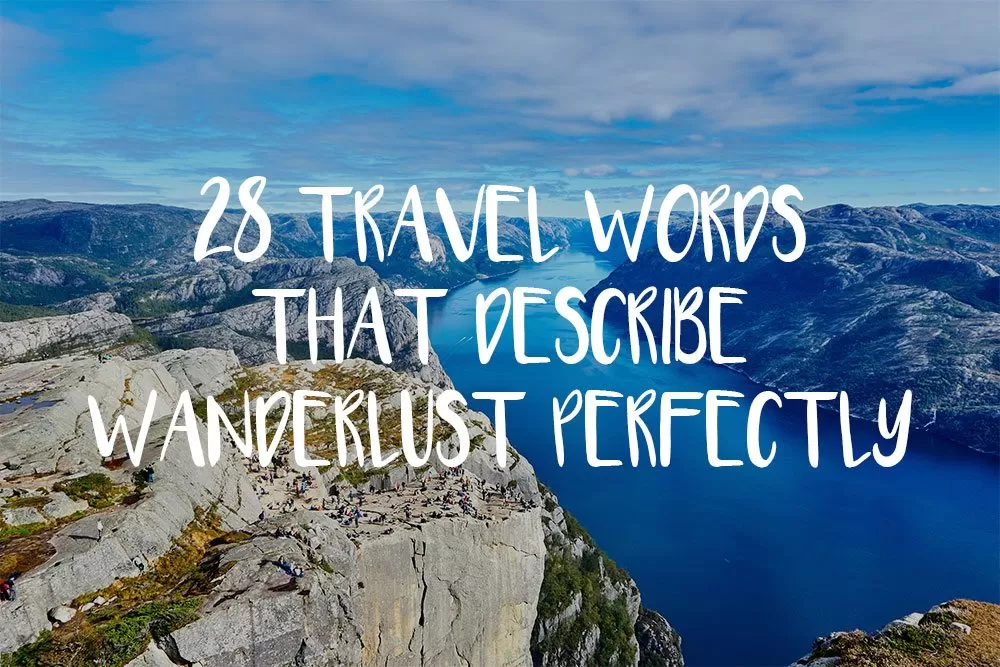
Describe your travels with these unique and beautiful travel words from different languages around the world.
I love travelling and I love languages, so imagine my excitement when I came across a treasure trove of travel words and wanderlust synonyms that describe how we feel before, during, and after we travel.
Just like a photo can’t fully capture what it feels like to stand on the edge of a fjord , neither can ‘wanderlust’ fully express how we feel when we crave our next adventure. These travel words are literary gems which have been gathered from languages around the world. From Japanese to Swedish , Latin to Greek , travel brochures of the future will be peppered with travel words like of resfeber , livsnjutare, and coddiwomple .
Wanderlust meaning
As you’ll see in the list below, every language has its own variation of how it explains and defines what wanderlust is. In English, wanderlust means to have a strong desire for or impulse to travel, wander and explore the world.
Learn a language from home
During these times it can be bittersweet to think about travelling when we have to stay at home and practice social distancing, let this list of wanderlust-filled words inspire you to a learn a language from home and prepare yourself for your next trip. Being travel fluent is the best way to enrich your travel experiences.
Without further ado, here are 28 beautiful travel words you should slip into your vocabulary. When you’re done, take and look at this collection of inspirational travel quotes . I’d love to hear which ones are your favourites in the comment section below.
Table of Contents
- Eleutheromania
- Quaquaversal
- Schwellenangst
- Strikhedonia
- Livsnjutare
- Novaturient
- Coddiwomple
1. Resfeber (n.)
Origin: Swedish
Definition: The meaning of resfeber refers to the restless race of the traveller’s heart before the journey begins when anxiety and anticipation are tangled together.
It’s that moment just after you buy your plane tickets and excitement and fear floods in all at once, creating a mixture of emotions that make you feel anxious or physically ill.
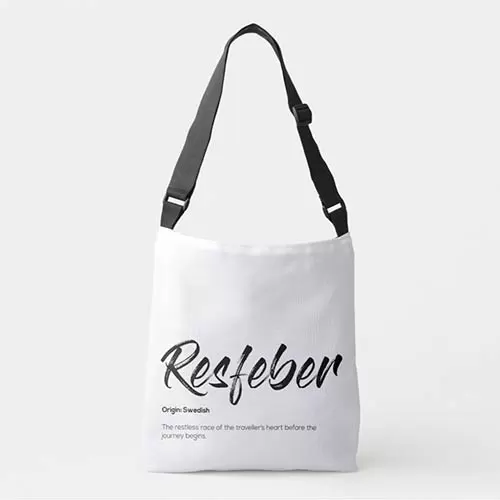
For more inspiration, don’t miss my guide to cool gifts for language learners and the best travel accessories and travel gadgets here.
2. Sonder (v.)
Origin: Unknown
Definition: The realisation that each passerby is living a life as complex as your own.
The full definition, taken from The Dictionary of Obscure Sorrows reads:
[Sonder is] the realization that each random passerby is living a life as vivid and complex as your own—populated with their own ambitions, friends, routines, worries, and inherited craziness—an epic story that continues invisibly around you like an anthill sprawling deep underground, with elaborate passageways to thousands of other lives that you’ll never know existed, in which you might appear only once, as an extra sipping coffee in the background, as a blur of traffic passing on the highway, as a lighted window at dusk.
I often feel this way when I pass groups of strangers, speaking a language that is completely foreign to me, and realise just how incredibly big the world is. We all have a life that is full of different connections, memories and possibilities. That’s sonder.
The internet suggests this may not be a real word, either way, the concept is beautiful.
3. Solivagant (adj.)
Origin: Latin
Definition: Wandering alone. A solitary adventurer who travels or wanders the globe.
Not all those who wander are lost, but all those who wander alone are definitely solivagants . From the Latin word solivagus , meaning lonely or solitary, solivagant describes anyone who enjoys meandering around new countries, alone, in order to take it all in.
4. Fernweh (n.)
Origin: German
Definition: This German word,means an ache to get away and travel to a distant place, a feeling even stronger than wanderlust. If wanderlust wasn’t poetic enough for you, allow me to present fernweh , a German word that literally translates to “distance-sickness.”
While someone with wanderlust might sit at home and happily fantasise about all the places they might visit, someone with fernweh would feel a deeper sense of longing, a sort of homesickness but for foreign lands. For me, it’s wanting to be back in Rome . Fernweh is one of most those beautiful untranslatable words I’ve ever come across.
Carry this beautiful word with you with my Fernweh T-Shirt available in men’s and ladies styles and black or white. Buy it here.

5. Sehnsucht (n.)
Definition: A wistful longing and yearning in the heart for travels past and future.
One author translated it as the “ inconsolable longing in the human heart for we know not what .” Another compared it to “ a longing for a far-off country, but not one which we could identify.”
When you return from travelling and wish you could do it all over again and experience every moment like it was the first.
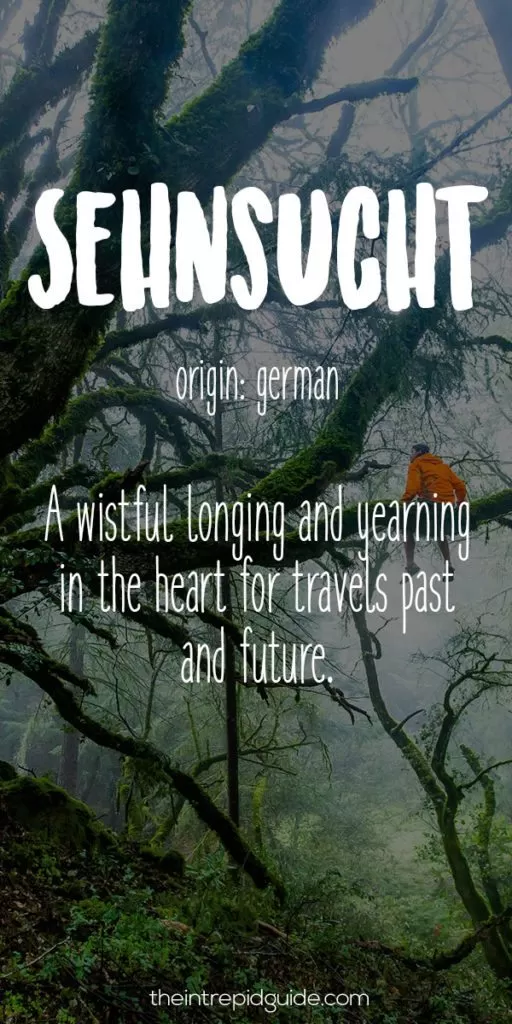
6. Eleutheromania (n.)
Origin: Greek
Definition: An intense and irresistible desire for freedom.
We all want to be free, and travelling shows us how the freedom in the lives of others that is different from our own. Eleutheromania describes a person who has a strong desire and obsession for freedom.
7. Cockaigne (n.)
Origin: French , Middle French
Definition: An imaginary land of luxury and idleness.
Every destination seem like a wonderland or cockaigne before you set foot there and see it for yourself.
The term c ockaigne ” comes from the Middle French phrase pais de cocaigne, which literally means “the land of plenty.” The word was first popularised in a 13th-century French poem that is known in English as “The Land of Cockaigne.”
8. Quaquaversal (adj.)
Definition: Moving or happening in every direction instantaneously.
This perfectly describes my state when I’m in a new place and want to see and do everything at once.
9. Dérive (n)
Origin: French
Definition: A spontaneous and unplanned journey where the traveller leaves their life behind allows themselves to be guided by the landscape and architecture.
Literally translated as “drift”, dérive is the idea that even if you drift you will end up on the right path. This could describe life in general, but it also describes small journeys. When you’re wandering through a new city and you just happen to wander on a path that takes you to great discoveries.
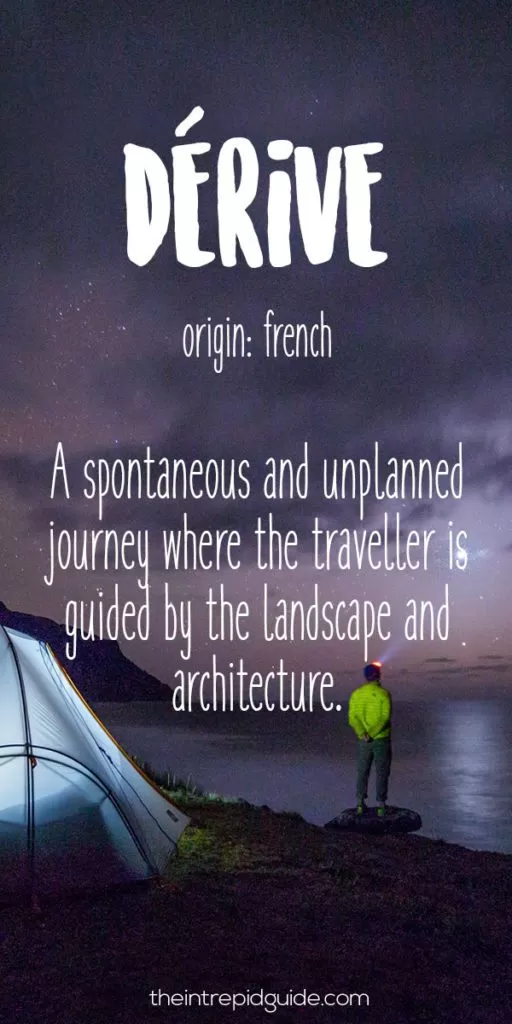
10. Ecophobia (n.)
Origin: English
Definition: This word came into English word via Greek and means a fear or dislike of one’s home.
I don’t dislike my home, but recently I can’t stop thinking about going back to Lofoten, Norway.
11. Numinous (adj.)
Definition: A powerful feeling of both fear and fascination, of being in awe and overwhelmed by what is before you.
Originally, this word refers to having a strong religious or spiritual quality; but it can also be used to describe how you feel when you see things that are so beautiful that you realise how wonderful the world is and the small part you play in it. Hiking Trolltunga was a numinous moment for me.
12. Schwellenangst (n.)
Definition: Fear of crossing a threshold to begin a new chapter.
From s chwelle (“threshold”) and a ngst (“anxiety”), this word explains that feeling you get before deciding to set out on a new journey. Argh! Did I make the right decision?
13. Strikhedonia (n.)
Definition: The pleasure of being able to say “to hell with it”.
Another personal favourite word on this list. Not only is it the joy I feel, but the freedom to be able to say “to hell with it” and book that next trip and embark on your next adventure.
14. Vagary (v.)
Definition: A whimsical or roaming journey.
From Latin, vagārī meaning “ to roam”, is an unpredictable idea, desire or action to travelling without knowing the destination, and not caring.
15. Livsnjutare (n)
Definition: Literally meaning, “enjoyer of life”, this describes a person who loves life deeply and lives it to the extreme.
If you’re reading this, that’s probably you! Need more inspiration?
16. Commuovere (v.)
Origin: Italian
Definition: To stir, to touch, to move to tears.
Just like the euphoric emotions I felt whilst whale watching.
17. Sturmfrei (adj.)
Definition: The freedom of being alone and being able to do what you want.
Literally translating to “stormfree”, this describes the freedom of not being watched by others and being alone in a place where you have the freedom and ability to do what you want.
Another great German word. Travelling solo can be especially rewarding because you have complete control. No compromises, no one else to please. Just you and the big wide world.
18. Saudade (n.)
Origin: Portuguese
Definition: This Portuguese word describes the emotional state of nostalgia and longing for someone or something distant. S audade was once described as “the love that remains” after someone is gone.
Saudade is the recollection of feelings, experiences, places, or events that brought excitement and happiness but now triggers the senses and makes one live again.
19. Yūgen (n.)
Origin: Japanese
Definition: A profound and mysterious sense of the beauty of the universe.
An awareness of the Universe that triggers emotional responses too deep and powerful for words.
20. Acatalepsy (n.)
Definition: The impossibility of comprehending the universe.
Henry Miller said “ One’s destination is never a place, but a new way of seeing things. ” Do we ever really understand the world and what we see on our travels, and how they mould us? Sometimes, if at all, it takes time to discover how these things change our lives.
21. Trouvaille (n.)
Definition: A chance encounter with something wonderful.
Whether it’s stumbling across a hidden back street, a quaint cafe, or connecting with a local, trouvaille describes those magical moments we experience in our journeys.
22. Hygge (n.)
Origin: Danish
Definition: Pronounced hue-guh , hygge describes the warm feeling you get while enjoying the company of great friends and all life has to offer.
Hygge is the conscious appreciation of recognising everything you have and enjoying to the present moment.
23. Onism (n.)
Definition: The world is a big place as not everyone will get to see it. Onism describes understanding that we’ll never get to see it all. It’s the frustration of being stuck in just one body that can only inhabit one place at a time. I felt this way before going to Copenhagen !
Similar to the Swedish word ‘resfeber’, onism describes the feeling of knowing that you’ll never be able to see it all. They say that the more you travel, the harder it gets to stay in one place.
24. Novaturient (adj.)
Definition: A desire to change and alter your life.
This was exactly how I felt when I quit my job and moved to Rome . There was this strong urge that pulled me towards my dream of pursuing a life of speaking Italian and travelling. I knew I wouldn’t be living my life if I didn’t go.
25. Yoko meshi (n.)
Definition: This untranslatable gem describes the stress of speaking a foreign language .
The Japanese word ‘meshi’ literally means ‘boiled rice’ and ‘yoko’ means ‘horizontal,’ together it means ‘a meal eaten sideways.’ The Japanese have created a beautiful way of describing the unique kind of stress you experience when speaking a foreign language. Furthermore, ‘yoko’ also references the fact that Japanese is normally written vertically, whereas most foreign languages are written horizontally. Clever, right?
Related: 69 Wonderful Japanese Expressions That Will Brighten Your Day
26. Selcouth (adj.)
Origin: Old English
Definition: When everything you see and experience is unfamiliar and strange, yet you find it marvellous anyway.
It’s that feeling you get when you travel to a foreign land and food, culture, customs, or language, is strange and different to everything you’ve experienced before, yet you love it and find it fascinating.
27. Eudaimonia (n.)
Definition: A state of being happy whilst travelling and everything feels great.
That intense excitement and appreciation when you travel and everything feels great. Seeing the Northern Lights was one of the best experiences of my life, a feeling I won’t forget.
28. Coddiwomple (v.)
Origin: English slang
Definition: To travel purposefully towards an unknown destination.
A brilliant word, coddiwomple is when you have a vague idea of your destination within a care for how long it takes to arrive. A great example is when you go hiking, you know you’ll eventually reach the summit, but every part of the trail along the way is just as beautiful. Like the time I hiked Norway’s Trolltunga.
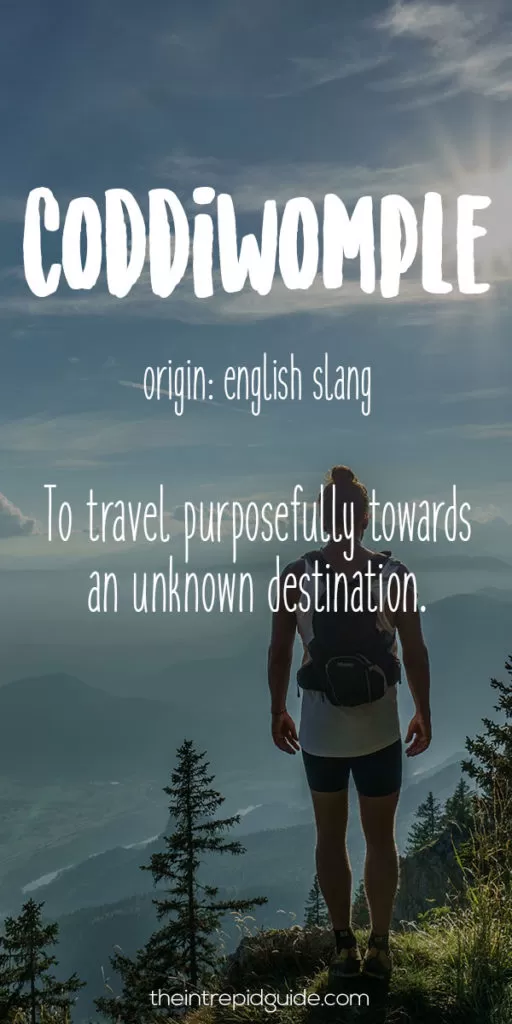
If you enjoyed these words, then let wordsmiths Stephen King, Mark Twain and the Dalai Lama transport you around the world with these inspirational travel quotes or start using some of the beautiful untranslatable words from other languages.
Want to know more about learning languages? Start here!
- 18 Unexpected Advantages & Health Benefits of Learning A Foreign Language
- The World’s Most Beautiful Untranslatable Words from Around the World: The Ultimate List A-Z
- 13 Ways to Seamlessly Integrate Language Learning into Your Daily Life
- What Type of Language Learner Are You? Your 4-Step Personalised Learning Plan
- 15 Top Language Learning Resources You Should Use
- 7 Reasons Why You Should Go on a Language Holiday
- 11 Life-Changing Reasons Why You Should Learn a Language
- How to Learn Your First Foreign Language in 8 Simple Steps: A Beginner’s Guide
- 42 beautiful Inspirational Quotes for Language Learners
- Language learning tips: 11 Polyglots Reveal The Secrets of Their Success
- Top 10 Best Ways to Learn a Language Better and Faster
- How to Learn Italian Before Your Trip
- Free Travel Phrase Guides
- How a ‘Potato’ improved my French Pronunciation
- How Many Languages are there in the World?
- Hilarious Idiomatic Expressions that Will Brighten Your Day
- 78 FREE Dictionaries to Learn a Language Fast [Free eBook Download]
- 22 KEY Travel Phrases That Will Transform Your Travels [Free Guide]
Over to you!
Which one of these travel words do you identify with the most? What others would you add? Let me know using the comments section below or join me on social media to start a conversation.
Thanks for reading and I hope you enjoyed this post.
Like what you see? Subscribe using the form below to have all of my posts delivered directly to your email.
Success! Now check your email to confirm your subscription.
There was an error submitting your subscription. Please try again.
Get my best language and travel tips FREE by email...
Subscribe to my newsletter to receive detailed travel guides, exclusive travel and language learning tips, priority access to giveaways and more!
I will never give away, trade or sell your email address. You can unsubscribe at any time.
Michele creates language learning guides and courses for travel. What separates her from other instructors is her ability to explain complex grammar in a no-nonsense, straightforward manner using her unique 80/20 method. Get her free guide 9 reasons you’re not fluent…YET & how to fix it! Planning a trip? Learn the local language with her 80/20 method for less than the cost of eating at a tourist trap restaurant Start learning today!
Italian Cognates & Loanwords: 17 Rules to Italianizing English Words You Already Know
124 inspirational travel quotes that’ll make you want to travel in 2022, 12 comments.
Amazing list! One word I’d add is the Dutch word “gezellig” or “gezelligheid” – similarly to hygge, it describes a feeling of warmth/comfort/coziness/quaintness in certain settings or around certain people.
Thank you so much for sharing this Heba. So interesting to learn that Dutch has a similar word 🙂
This is such a fun article! Love these words and phrases!
Glad to hear it! Thank you so much, Eric 🙂
So many of these describe me or my feelings about seeing the world. But, if I had to pick one, the one that best describes how I choose my destinations would be “selcouth”. I so want to be a stranger in a strange land. To have my belief that there is no such thing as “normal” affirmed again and again and over again.
What a beautiful word. Thanks for sharing, Janet 🙂
Thanks Michele what a wonderful list of inspirational words. It nearly made me cry as I realised that I suffer from acute eleutheromania! ha
Thanks Juliana 🙂 I’m so glad you enjoyed this list. Eleutheromania? I know how you feel hehe
Unique list i must say – If you want to add one more word than check this !
In Hindi language (India) traveler called as “Musafir”
thanks Niraj 🙂
Thanks for sharing this! Really enjoyed it a lot ❤
Thanks Donah, I’m so glad you enjoyed it 😉
Leave a Comment Cancel Reply
Save my name, email, and website in this browser for the next time I comment.
This site uses Akismet to reduce spam. Learn how your comment data is processed .

If you don't know where you are , how do you know where you're going? Find out how well you know Italian grammar today!
MyVocabulary.com

- Word Roots #1 Beginner
- Word Roots #1 Intermediate
- Word Roots #1 Advanced
- Word Roots #2 Beginner
- Word Roots #2 Intermediate
- Word Roots #2 Advanced
- Word Roots #3 Beginner
- Word Roots #3 Intermediate
- Word Roots #3 Advanced
- Word Roots #4 Beginner
- Word Roots #4 Intermediate
- Word Roots #4 Advanced
- Word Roots #5 Beginner
- Word Roots #5 Intermediate
- Word Roots #5 Advanced
- Word Roots #6 Beginner
- Word Roots #6 Intermediate
- Word Roots #6 Advanced
- Word Roots #7 Beginner
- Word Roots #7 Intermediate
- Word Roots #7 Advanced
- Word Roots #8 Beginner
- Word Roots #8 Intermediate
- Word Roots #8 Advanced
- Word Roots #9 Beginner
- Word Roots #9 Intermediate
- Word Roots #9 Advanced
- Word Roots #10 Beginner
- Word Roots #10 Intermediate
- Word Roots #10 Advanced
- Word Roots #11 Beginner
- Word Roots #11 Intermediate
- Word Roots #11 Advanced
- Word Roots #12 Beginner
- Word Roots #12 Intermediate
- Word Roots #12 Advanced
- 112 Prefix Words by Alpha
- 112 Prefix Words by Grade
- 32 Suffix Words by Grade
- 32 Suffix Words by Alpha
- SEQU SECU #1
- SPECT SPIC #1
- MISS MITT #1
- CEPT CIP CAP #1
- VERT VERS #1
- STA SIST STIT #1
- REG RECT RIG #1
- PEND PENS POUND #1
- Alphabetical-All Subject & Themed Puzzles
- English Language Arts
- English Literature
- General Interest
- Health, Nutrition & PE
- Holidays & Celebrations
- Performing Arts & Fine Arts
- Science & Math
- Social Studies & History
- All themed Crosswords
- All themed Fill-in-the-Blanks
- All themed Definition Match
- All themed Word Search
- All themed WordPuzzles
- Alphabetical: all word lists A to E
- Alphabetical: all word lists F to O
- Alphabetical: all word lists P to Z
- Animals, Birds, Insects
- Business, Economics
- English, Language Arts
- Foreign Language, ESL, ELL, LEP
- Health and Physical Education
- History, Social Studies
- Holidays, Celebrations
- People, Groups
- Vocational Education
- GRE Test Prep
- Word List by Title
- Word List by Author
- 17 Novel Puzzles
Travel and Leisure Vocabulary Word List (363)
Wordnote - Learn vocabulary 4+
Note your new word and learn, designed for iphone, iphone screenshots, description.
Wordnote is your personal vocabulary companion designed to make learning new words effortless and enjoyable. Whenever you encounter a word that piques your interest, simply add it to the app, and let Wordnote take care of the rest. Key Features: Seamless Word Capture: Capture new words effortlessly as you encounter them in movies, books, articles, or conversations. With a simple tap, add the word and its context to your Wordnote vault. Widget Integration (iOS): Stay on top of your vocabulary growth with the Wordnote widget. Receive timely reminders and word suggestions right on your iOS device's home screen, keeping your learning journey front and center. Interactive Language Game: When you're ready to put your vocabulary to the test, dive into the exciting Wordnote game. Each word you add to the app unlocks a unique puzzle where you must unscramble the translated text and characters from the original source material. Challenge yourself and sharpen your language skills in a fun and engaging way. Comprehensive Word Details: Access comprehensive definitions, usage examples, synonyms, and pronunciation guides for each word in your Wordnote vault. Gain a deeper understanding of the word's meaning and usage to enhance your language proficiency. Customizable Learning Experience: Tailor Wordnote to your learning style and preferences. Set personalized reminders, adjust difficulty levels in the language game, and customize the app's interface to create an optimal learning environment. Progress Tracking & Achievements: Track your vocabulary growth and monitor your learning progress over time. Earn achievements as you master new words, staying motivated and inspired to continue expanding your lexicon. Sync Across Devices: Seamlessly sync your WordQuest account across multiple devices, ensuring your word collection and progress are always up to date, whether you're using your smartphone, tablet, or computer. Offline Access: Learn on the go, even without an internet connection. Download your word collection and game puzzles to access them anytime, anywhere, ensuring uninterrupted learning wherever you are. Unlock the power of words and embark on a thrilling quest to expand your vocabulary with Wordnote. Download now and turn every new word discovery into an opportunity for growth and adventure!
App Privacy
The developer, Tu Hoang , indicated that the app’s privacy practices may include handling of data as described below. For more information, see the developer’s privacy policy .
Data Not Collected
The developer does not collect any data from this app.
Privacy practices may vary, for example, based on the features you use or your age. Learn More
Information
- App Support
- Privacy Policy
More By This Developer
Just Calendar + Complications
Tinh Tế News
Ghi Điểm Đánh Bài
You Might Also Like
Learn English with AI Coach
Learn Words with AI Assistant
Wordmit – English Vocabulary
Wordnotes - Boost Vocabulary
School Planner My Homework
RemindVocab
10 things I wish tourists knew before visiting Greece, from a local
- I'm from Athens, and I've seen plenty of tourists make mistakes while traveling to Greece .
- Pace yourself if you're planning on staying out at the bars and clubs all night.
- It's worth it to do some research on smaller islands and local cuisine before your trip.

Thanks to its ancient ruins, picturesque beaches, and incredible food, Greece is one of the top tourist destinations. In 2023, over 32 million people visited.
I was born in Athens and currently split my years living between the US and Greece , so I've spent plenty of time in the beautiful European country.
Here are 10 things I think tourists should know before visiting.
There’s so much more to see in Greece than the popular islands.
It seems like everyone visits Mykonos, Santorini, and maybe Paros, but Greece has over 220 inhabitable islands. Plus, most of them are more budget-friendly than the popular spots.
I recommend looking into places like Kimolos, Astypalaia, Paxoi (also known as Paxos and Paxi), or Folegandros.
The Greek mainland is also beautiful. There's a lot to see there, from UNESCO sites at Delphi and Meteora and the turquoise waters of the Peloponnese to the stunning mountains and villages of Epirus.
Athens is more than the Acropolis.
Athens has great nightlife , restaurants, museums, and cool neighborhoods like Plaka, Exarcheia, Psyrri, and Pangrati.
Tourists who just swing by to check the Acropolis off their list are missing out. I've always found it to be one of the liveliest cities in the world.
You don’t need to tip 20%.
Greek servers generally rely on hourly wages, so there isn't the same tipping culture as the US .
I normally just round up the bill or leave a couple of Euros on the table as a tip — unless I had exceptional service or dined at a more formal (and tourist-oriented) restaurant.
Pace yourself when drinking alcohol.
A lot of travelers take advantage of Greece's lax attitude toward alcohol restrictions. Coupled with the fact that Greek bars and clubs close pretty late (like 4 a.m. late), some tourists get sloppy.
Locals usually intersperse drinks with food and water so they can last the whole night, and I recommend tourists do the same.
Slow down and take Sundays off.
Greeks have a pretty relaxed relationship with time — people often arrive late and stores may open half an hour after they said they would.
Service in Greece can seem slow to people from more fast-paced places, especially on the quieter islands . A lot of stores and supermarkets are also closed on Sundays, even in Athens.
I know this can be annoying at times, but I recommend just enjoying the slower pace of life.
Don’t try to visit too many islands on one trip.
So many people ask me if they can fit four or five islands into a seven-day trip, and I never recommend it. Take your time and enjoy each destination for at least a couple of days.
Half the joy of the Greek islands is getting to destress. If you're hopping from ferry to ferry and running around to cover the highlights, you'll miss out on the best parts of the country.
Be sensitive about natural disasters.
I never thought I'd have to say this, but I have seen multiple tourists in the last few years posting about how "pretty" the skies or sunsets are thanks to the glow from raging wildfires .
At a time when a lot of Greek people are wondering if their houses are still standing or their loved ones have gotten to safety, it's a pretty insensitive thing to do.
Don't skip out on experiencing a traditional taverna.
Athens and other popular Greek destinations now have a lot of upscale restaurants with cuisines from all over the world. But make sure to eat in a traditional taverna at least once.
A taverna is a casual restaurant with family-style dining. Diners can spend hours in them chatting with friends while sharing food paired with some great wine or ouzo (a Greek aperitif).
Greek food is more than just gyros.
Well-known dishes like gyros and souvlaki are truly delicious, but Greek cuisine is so much more than that.
For example, a lot of Greeks start their day with a tiropita (cheese pie) and freddo coffee. Each region also has local specialties that I recommend inquiring about.
In tavernas, popular menu items include calamari, octopus, all kinds of fish, grilled and fried cheeses (like saganaki and halloumi), and side dishes like fava.
Learn a few local words.
Most younger Greek people understand English, but you may run into problems communicating with older people — especially in more rural areas.
Even if a local person can understand you, I think it's nice to learn a few simple words and phrases like "good morning," "thank you," and "how are you?"
It's nice when tourists make a little bit of an effort.
- Main content
Word of the Day
What it means.
An act or manner described as gingerly is very cautious or careful.
// It’s a delicate subject, and we need to approach it with gingerly care and tact .
// The antelope moved with a gingerly gait that suggested it was hurt.
See the entry >
gingerly in Context
“Note: bears do not in a gingerly manner put their paws against each stem of a lovely ripe pear and gently pull upward against the branch, the proper harvesting method. ‘Picked’ in bear-lingo means tearing down carefully constructed tree cages and knocking as many branches to the ground as needed; then taking several bites out of each luscious pear, leaving scattered remnants all over the ground ...” — Cate Gable, The Chinook Observer (Long Beach, Washington), 14 Oct. 2020
Build your vocabulary! Get Word of the Day in your inbox every day.
Fashionable words.

- Which of these items is named for a deadly weapon?
- Fedora hat Henley shirt
- Brogue shoes Stiletto heel

You know what it looks like… but what is it called?

You can make only 12 words. Pick the best ones!
Did You Know?
Though more common as an adverb meaning “very cautiously and carefully,” as in “moving gingerly across the icy pond,” gingerly has for more than four centuries functioned both as an adverb and as an adjective. Etymologists take a gingerly approach to assigning any particular origins to gingerly . While it might have come from the name of the spice , there’s nothing concrete to back up that idea. Another theory is that it’s related to an Old French word, gençor , meaning “prettier” or “more beautiful,” with evidence being that in 16th century English an earlier sense of gingerly often described dancing or walking done with dainty steps. It wasn’t until the 17th century that gingerly was applied to movements done with caution in order to avoid being noisy or causing injury, and to a wary manner in handling or presenting ideas.
Test Your Vocabulary with M-W Quizzes

What Did You Just Call Me?

Guess the Curious Origins of These Everyday Words

Name That Flower

12-Letter Words Quiz

Challenging Standardized Test Words Vol. 3

Are You Feeling Lucky?
Name That Antonym
Fill in the blanks to complete an antonym of gingerly : h e _ _ l e _ s.
More Words of the Day
Noblesse oblige, circumlocution, inalienable.

Can you solve 4 words at once?
Subscribe to America's largest dictionary and get thousands more definitions and advanced search—ad free!
Games & Quizzes

AI has a lot of terms. We've got a glossary for what you need to know
Ai has a lot of terms. we've got a glossary for what you need to know, gpu tpu llm all the important ai vocabulary to know.

When people unfamiliar with AI envision artificial intelligence , they may imagine Will Smith’s blockbuster I, Robot, the sci-fi thriller Ex Machina, or the Disney movie Smart House — nightmarish scenarios where intelligent robots take over to the doom of their human counterparts.
Today’s generative AI technologies aren’t quite all-powerful yet. Sure, they may be capable of sowing disinformation to disrupt elections or sharing trade secrets . But the tech is still in its early stages, and chatbots are still making big mistakes .
Still, the newness of the technology is also bringing new terms into play. What makes a semiconductor, anyway? How is generative AI different from all the other kinds of artificial intelligence? And should you really know the nuances between a GPU, a CPU, and a TPU?
If you’re looking to keep up with the new jargon the sector is slinging around, Quartz has your guide to its core terms.
What is Generative AI?

Let’s start with the basics for a refresher. Generative artificial intelligence is a category of AI that uses data to create original content. In contrast, classic AI could only offer predictions based on data inputs, not brand new and unique answers using machine learning. But generative AI uses “ deep learning ,” a form of machine learning that uses artificial neural networks (software programs) resembling the human brain, so computers can perform human-like analysis.
Generative AI isn’t grabbing answers out of thin air, though. It’s generating answers based on data it’s trained on, which can include text, video, audio, and lines of code. Imagine, say, waking up from a coma, blindfolded, and all you can remember is 10 Wikipedia articles. All of your conversations with another person about what you know are based on those 10 Wikipedia articles. It’s kind of like that — except generative AI uses millions of such articles and a whole lot more.
What is a chatbot?

AI chatbots are computer programs that generate human-like conversations with users , giving unique, original answers to their queries. Chatbots were popularized by OpenAI’s ChatGPT, and since then, a bunch more have debuted: Google Gemini, Microsoft CoPilot, and Salesforce’s Einstein lead the pack, among others.
Chatbots don’t just generate text responses — they can also build websites, create data visualizations, help with coding, make images, and analyze documents. To be sure, AI chatbots aren’t foolproof yet — they’ve made a lot of mistakes already . But as AI technology rapidly advances, so will the quality of these chatbots.
What is a Large Language Model (LLM)?
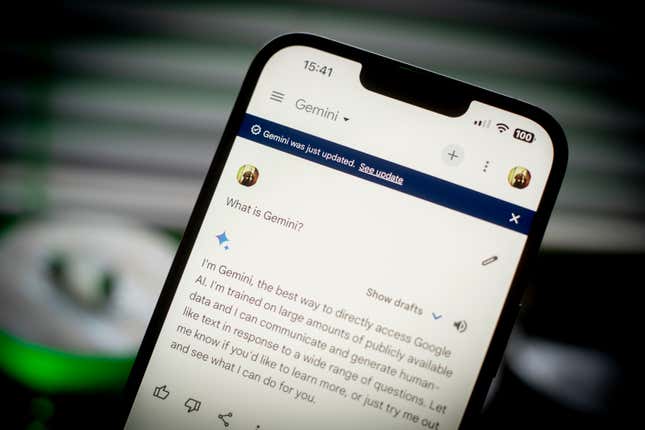
Large language models (LLMs) are a type of generative artificial intelligence. They are trained on large amounts of data and text, including from news articles and e-books, to understand and generate content, including natural language text. Basically, they are trained on a ton of text so they can predict what word comes next. Take this explanation from Google:
“If you started to type the phrase, “Mary kicked a…,” a language model trained on enough data could predict, “Mary kicked a ball.” Without enough training, it may only come up with a “round object” or only its color “yellow.” — Google’s explainer
Popular chatbots like OpenAI’s ChatGPT and Google’s Gemini, which have capabilities such as summarizing and translating text, are examples of LLMs.
What is a semiconductor?

No, it’s not an 18-wheeler driver. Semiconductors, also known as AI chips , are used in electrical circuits of devices such as phones and computers. Electronic devices wouldn’t exist without semiconductors, which are made from pure elements like silicon or compounds like gallium arsenide, to conduct electricity. The name “semi” comes from the fact that the material can conduct more electricity than an insulator, but less electricity than a pure conductor like copper .
The world’s largest semiconductor foundry, Taiwan Semiconductor Manufacturing Company (TSMC), makes an estimated 90% of advanced chips in the world, and counts top chip designers Nvidia and Advanced Micro Devices (AMD) as customers.
Even though semiconductors were invented in the U.S. , it now produces about 10% of the world’s chips, not including advanced ones needed for larger AI models. President Joe Biden signed the CHIPS and Science Act in 2022 to bring chipmaking back to the U.S. , and the Biden administration has already invested billions into semiconductor companies including Intel and TSMC to build factories throughout the country. Part of that effort also has to do with countering China’s advancements in chipmaking and AI development.
What are GPUs & CPUs?

A GPU is a graphics processing unit, an advanced chip (or semiconductor) that powers the large language models behind AI chatbots like ChatGPT. It was traditionally used to make video games with higher quality visuals .
Then a Ukrainian-Canadian computer scientist, Alex Krizhevsky , showed how using a GPU could power deep learning models a whole lot faster than a CPU — a central processing unit, or the main hardware that powers computers.
CPUs are the “brain” of a computer, carrying out instructions for that computer to work . A CPU is a processor , which reads and interprets software instructions to control the computer’s functions. But a GPU is an accelerator, a piece of hardware designed to advance a specific function of a processor.
Nvidia is the leading GPU designer, with its H100 and H200 chips used in major tech companies’ data centers to power AI software. Other companies are aiming to compete with Nvidia’s accelerators , including Intel with its Gaudi 3 accelerator, and Microsoft’s Azure Maia 100 GPU.
What is a TPU?

TPU stands for “tensor processing unit.” Google’s chips, unlike those of Microsoft and Nvidia, are TPUs — custom-designed chips made specifically for training large AI models (whereas GPUs were initially made for gaming, not AI).
While CPUs are general-purpose processors and GPUs are an additional processor that run high-end tasks, TPUs are custom-built accelerators to run AI services — making them all the more powerful.
What is a hallucination?

As mentioned before, AI chatbots are capable of a lot of tasks, but they also slip up a lot. When LLMs like ChatGPT make up fake or nonsensical information , that’s called a hallucination .
Chatbots “hallucinate” when they don’t have the necessary training data to answer a question, but still generate a response that looks like a fact. Hallucinations can be caused by different factors such as inaccurate or biased training data and overfitting, which is when an algorithm can’t make predictions or conclusions from other data than what it was trained on.
Hallucinations are currently one of the biggest issues with generative AI models — and they’re not exactly easy to solve for. Because AI models are trained on massive sets of data, it can make it difficult to find specific problems in the data. Sometimes, the data used to train AI models is inaccurate anyway, because it comes from places like Reddit . Although AI models are trained to not answer questions they don’t know the answer to, they sometimes don’t refuse these questions, and instead generate answers that are inaccurate.
What is a fortnight? Taylor Swift's 'The Tortured Poets Department' vocabulary explained
Taylor Swift released “The Tortured Poets Department” on Friday , introducing a new era of artistry for the global superstar. You might need a thesaurus on standby while listening.
Her long-anticipated eleventh album, excluding her “Taylor’s Version” re-recordings, is her most recent release since Midnights, which came out in Oct. 2022.
Swift is infamous for dropping “Easter eggs,” or clues that tell a larger story about her or an album’s concept. This record is no exception.
The album features Swift’s classic poppy and lyrical style, but introduces a host of new vocabulary words, urging listeners to sprint to Google to decode the songs’ meanings.
Music: Taylor Swift's 'Tortured Poets' is hauntingly brilliant, even the 15 surprise songs
What is a fortnight?
The intro track on “The Tortured Poets Department” is titled “Fortnight” and features rapper Post Malone.
Swift sings, “And for a fortnight, there we were, forever running.” A fortnight refers to a period of two weeks. The term’s usage peaked in the 1860s.
When will the “Fortnight” music video be released?
Swift announced “Fortnight” will get a music video in an Instagram post on Friday. The video will be available at 5 p.m. Arizona time on Friday.

IMAGES
VIDEO
COMMENTS
Wrapping Up Our English Travel Vocabulary Journey. And there you have it! We've journeyed through 40 essential English words and phrases that will help make your travels smoother and more enjoyable. Remember, language is a powerful tool that can open doors to understanding new cultures, making new friends, and creating unforgettable ...
Air Travel Vocabulary and Sample Sentences. Airport: I went to the airport to catch a flight to San Francisco. Check in: Make sure to get to the airport two hours early to check in. Fly: I like to fly on the same airline to get mileage points. Land: The airplane will land in two hours. Landing: The landing took place during a storm.
English is often used in travel situations as a common language which many people can speak. This means that knowing some English phrases can make your trip safer and more fun, even if you're not traveling to a place where English is the official language. Travel is also an amazing reason to improve your English.
Travelling is going from a place to a distant place. Movement of people is considered as travel. People travel by many vehicles such as car, bus, plane, train or ship. These are called means of transport. ⬤ Pictures of travel vocabulary with pronunciations. Here is a list of travel vocabulary in English with pictures.
Travel Vocabulary: Using English for Travel Travel vocabulary is one of the most useful areas of language learning today, as more people than ever are travelling far and wide for business and pleasure. There are many useful words and phrases we use when travelling and dealing with transport. Although our travel plans have been put
17 Essential Travel Vocabulary - Words 1-5. 1. Book (a flight) A book is something you read (a noun), but the verb "to book" means "to reserve.". If you "book a flight," that means you reserve a flight. I booked a flight to Buenos Aires. Now I need to book an accommodation.
A vocabulary list featuring Travel Words. Used for Quick Guides 05/07, Add: home is where the heart is, across the country, down the block, around the world, take a trip, cross the globe, across the globe ... Vocabulary Jam Compete with other teams in real time to see who answers the most questions correctly! Spelling Bee Test your spelling ...
90 English Tourism Vocabulary Words and Phrases [With Sample Dialogues] English is the most common language used in the international tourism industry. People who work in the tourism industry use it to communicate with tourists from all over the world. If you work in tourism or hope to find a job in the industry, it helps to know the right ...
Gate. A gate is where you will enter to get to the airplane. It is also the place where you wait before boarding your flight. The gate is usually written on your boarding pass. Restroom. A restroom is a place where you take care of personal business like combing your hair, washing your face or using the toilet.
But before you pack your bags, don't forget to come back for part 2 of this blog post on travel words in English. We'll dive deeper into useful vocabulary for discussing your travel experiences, sharing the highlights and even the not-so-great moments of your adventures. After all, every trip has a story, and we'll help you tell yours!
If you travel by sea, you need to get to the port (for cruise ships) or the ferry terminal. Both cruise ships and ferries have different decks, with the upper decks for passengers and the lower decks for cars or cargo. More essential travel vocabulary words and phrases. suitcase = a large bag which goes in the hold of the aeroplane
Take a flight with BBC Learning English Airways ️ and improve your English vocabulary and speaking with Dylan. There are 27 travel-related words and express...
100+ Travel words: depart, arrive, transfer, splash out, check-in, accommodation, currency, take off, landing, alarm and more ›››› ... Home English Vocabulary 100 + Travel Words explained 🛫🏝 ️ Best Free Lesson. English Vocabulary; Infographics; 100 + Travel Words explained 🛫🏝 ️ Best Free Lesson. By. Amina - April 11 ...
Learn Laugh Speak is here to help you master essential travel vocabulary for English students. With our structured lessons at levels A1, A2, B1, and B2, you can easily learn the words and phrases you need for traveling in an English-speaking country. Our platform provides instant corrections, ensuring that you're learning English at the right ...
useful vocabulary words and phrases related to travel. Most of the times we BOOK our train or plane tickets in advance. We pay for a seat, a couchette, or berth in advance. BERTH - bed in a boat. COUCHETTE - bed on a train. For example, there are couchette coaches in Nightjet train which travels across Europe.
Learn English for free with 2049 video lessons by experienced teachers. Classes cover English grammar, vocabulary, pronunciation, IELTS, TOEFL, and more. Join millions of English learners worldwide who are improving every day with engVid. Learn important, basic words you will need when you travel. Knowing a little English vocabulary can help a ...
A vocabulary list featuring Travel. ... Travel is the movement of people or objects (such as airplanes, boats, trains and other conveyances) between relatively distant geographical (1) locations.Reasons for travelling include recreation,tourism or vacationing, for holiday to (3) visit people, (4)migration to begin life somewhere else, (5) religious pilgrimages and other reasons, such as to ...
luggage or baggage. map. passport control. suitcase. cancelled. delayed. Learn some English words related to travel, including the names of different means of transport. 44 vocabulary terms with sound.
Travel Vocabulary Words for ESL Beginners. Airport. a complex of runways and buildings for the take-off, landing, and maintenance of civil aircraft, with facilities for passengers. Check-in. the action of registering one's presence, typically as a passenger at an airport. Fly. travel through the air; be airborne.
Sample Writing using Travel English Vocabulary Words. Here is another entry from another student. Notice how the travel vocabulary changes as we change the place from a city to a hilly destination. Sample Writing 2. The other heaven on earth - Ladakh. There are no words to describe the dry beauty of Ladakh. That's right, Ladakh has a unique ...
4. Fernweh (n.) Origin: German. Definition: This German word,means an ache to get away and travel to a distant place, a feeling even stronger than wanderlust. If wanderlust wasn't poetic enough for you, allow me to present fernweh, a German word that literally translates to "distance-sickness.".
The IELTS Exam: Travel and Transportation. . With a strong grasp of travel vocabulary, you'll be well-prepared to navigate through the different sections of the IELTS exam. This collection of words can help you build a comprehensive vocabulary that will help you understand passages in the reading and listening sections, and it can help you ...
Travel and leisure vocabulary, Travel and leisure word list - a free resource used in over 40,000 schools to enhance vocabulary mastery & written/verbal skills with Latin & Greek roots. ... www.myvocabulary.com offers more than 555 word lists. To see Travel, Leisure, Vacations, and Summer word lists, ...
Download your word collection and game puzzles to access them anytime, anywhere, ensuring uninterrupted learning wherever you are. Unlock the power of words and embark on a thrilling quest to expand your vocabulary with Wordnote. Download now and turn every new word discovery into an opportunity for growth and adventure!
Pace yourself when drinking alcohol. The bars and clubs stay open really late in parts of Greece. Joanna Kalafatis. A lot of travelers take advantage of Greece's lax attitude toward alcohol ...
"Note: bears do not in a gingerly manner put their paws against each stem of a lovely ripe pear and gently pull upward against the branch, the proper harvesting method. 'Picked' in bear-lingo means tearing down carefully constructed tree cages and knocking as many branches to the ground as needed; then taking several bites out of each luscious pear, leaving scattered remnants all over ...
And should you really know the nuances between a GPU, a CPU, and a TPU? If you're looking to keep up with the new jargon the sector is slinging around, Quartz has your guide to its core terms. 1 ...
It's usually hard to take the bull by the horns, since it means facing a fear or embarking on something difficult or complicated. Most people feel great, though, once they take the bull by the horns. Experts disagree about the exact origins of the phrase, though it was first recorded in the early 1700's.
The album features Swift's classic poppy and lyrical style, but introduces a host of new vocabulary words, urging listeners to sprint to Google to decode the songs' meanings.
To accept a rule or act according to a recommendation is to abide by them. If a judge makes a ruling, you have to abide by her decision. If your parents set a curfew, you'll get in trouble if you don't abide by it. This phrase comes from the verb abide, which today means "tolerate," although it originally meant "wait," from a root meaning ...